#JOHN JUST LEARNED FROM PATTERN OF BEHAVIOR OKAY
Text


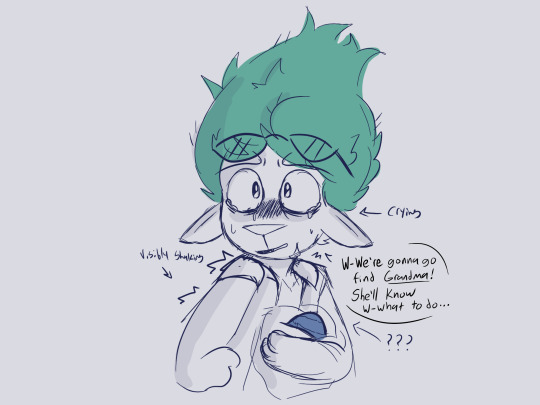
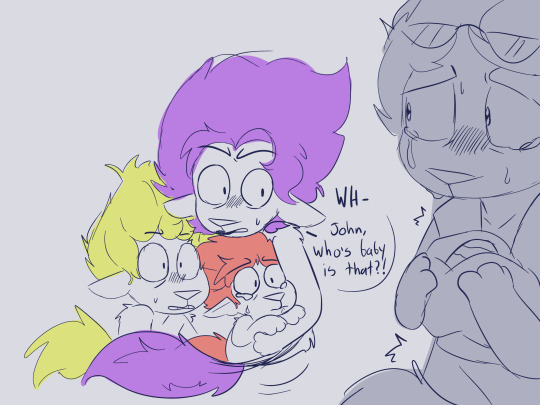

🥚John Dory and the lonely egg 💔

Headcanon that the brother's dad left before they even knew Branch existed and he was just left in a basket with a note for JD to find 🥲 we love giving our boys trauma ✨️
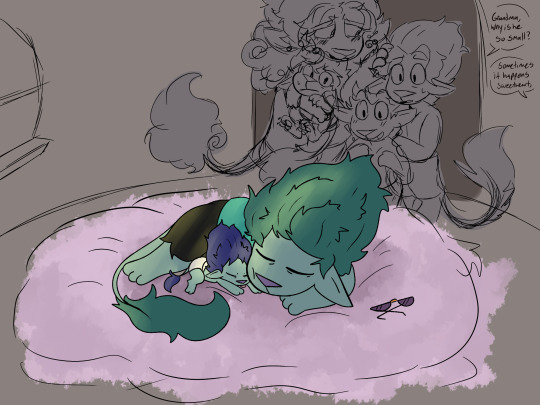
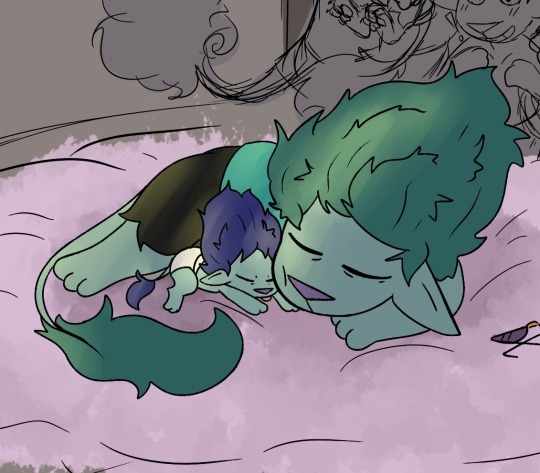
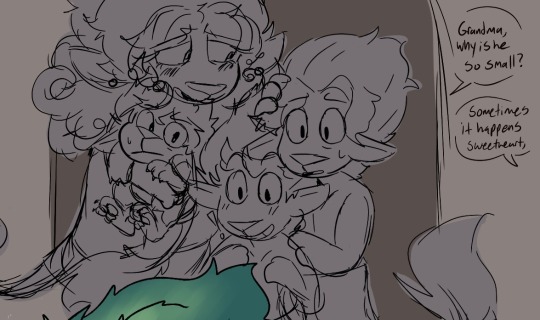
This is shortly after losing their mother 💕😭 BABY FLOYD IS SO CUTE HERE HELPPP give John a hug PLEASEEEE Branch is basically the equivalent to a premature baby because of this 😌🫶 so smol
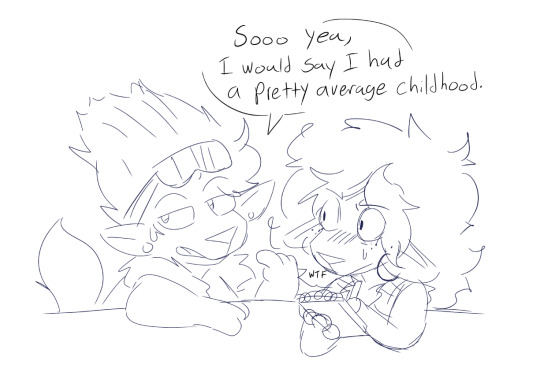
"Casually recites this extremely traumatic event with a shrug"
#johndorysmemior#trolls au#trolls headcanons#trolls with tails#dreamworks trolls#trolls branch#trolls john dory#trolls band together#trolls brozone#trolls bruce#trolls clay#trolls floyd#trolls grandma rosiepuff#angst#JOHN JUST LEARNED FROM PATTERN OF BEHAVIOR OKAY
1K notes
·
View notes
Text
jack: dean can’t even look at me. he wants to kill me.
sam: i won’t let that happen. (then) if there’s one thing dean respects, it’s effort. so come along, help us out. let’s go be the good guys.
-
sam: i asked you to keep an eye on [jack].
dean: i can see him. he keeps starin’ at me.
sam: yes, he wants you to like him.
-
mia: you just upset your brother so much he had to leave the room. and jack? look at him. he’s terrified of you.
dean: nah. no, we’re simpatico. right, kid?
jack: [flatly] we’re simpatico.
mia: convincing. (then) you’re angry, dean. and if you don’t want to do anything about it, that’s your business. but you’re aiming it at everyone in your life.
—
a continuation of this post—
not just dean / john parallels, but also dean / jack parallels. sam telling jack that getting on dean’s good side means making an effort in hunting reminds me of dean trying to emulate john — using his lingo, driving his car, dressing like him. when john rarely picked up the phone to answer dean’s calls. even how dean speaks to jack—
dean: listen, mr. spock. you speak when i tell you to speak, okay?
jack: yes—
dean: [cutting him off] good.
—reminds me of what dean said about john in 1x18 and 9x07, placing blame on himself for not obeying john’s orders. it hasn’t been quite as extreme here, but jack has had a pattern of mimicking dean’s behavior and habits, both to learn how to be human and to get in dean’s good graces. even letting dean perceive him as a potential threat and starting to buy into it. in this way, both brothers have been in his shoes, but sam has been cognizant of it while dean has repressed it, or maybe even consciously suppressed it, too caught up in who to direct his anger at to admit where it’s coming from in the first place.
1 note
·
View note
Note
Honestly it seems like some fans have trouble seem outside of Malcolm's pov, which is understandable given he is the show's protagonist and very sympathetic one at that. That being said regardless of how well intended Malcolm was he did make Ainsley doubt her own sense of reality and was projecting by assuming she wouldn't want to know or couldn't handle knowing. Yes the way Ainsley went about making that point was completely messed up but she did have a point to make.
Okay first things first, sorry it took me so long to get to this, I had a lot of thoughts to put together before I responded because I need to talk about Ainsley.
I’ll start with the fact that I seem to emphasize with Ainsley more than a lot of people. Maybe it’s because I am the youngest sibling, with older brothers. Maybe it’s because I have “easier mental illnesses” like OCD and ADHD in comparison to others. Maybe it’s the fact that one of my older brothers has much more severe mental health issues and I’ve been reminded how lucky I am in comparison to him and others. Maybe it’s because my mother has been my best friend since I was a teenager. Or maybe it’s because I try to be someone else's emotional support while neglecting my own mental health until I eventually snap. Maybe it’s the fact that supportive figures in my childhood have turned out to be less than ideal as of late. Bottom line, Ainsley is someone I care a lot about, and I need to talk about what is going on with her. And why she isn’t evil or abusive.
Let’s start out by debunking one argument. That being Ainsley’s lack of remorse over what she has done. Now this argument bothers me for a few reasons. Firstly, because Nicholas Endicott was a monster who deserved what he got and everyone on the show acknowledges that. Like Jessica and Malcolm do not morally disagree with killing him, Malcolm says flat out that he deserves to die. He’s just scared of being like his father and scared of losing his friends, this is an important distinction between him and Ainsley that I will get into. Secondly, we don’t see Ainsley’s initial reaction aside from her nearly crying in Malcolm’s flashback. According to Halston, she found out at some point around episode 4. Martin might have told her during their visit, she might have figured it out reading his journal, it could have been the nightmare she tells her mother about. We don’t know, we just know that by this point she has dealt with it.
Going back to Malcolm’s fear of losing his friends. Malcolm’s guilt is from having to lie to his found family at the precinct. That is what makes him feel awful. This is something Ainsley does not have. She does not have any found family to lose. Malcolm has to keep lying, Ainsley doesn’t have to. Obviously it eats her up less. Speaking of Ainsley’s support system, or lack thereof, let’s go through it. Starting up, Jessica, mother of the year, diminishes her daughter's career, blatantly insults her, emotionally neglects her for twenty years and snaps at her whenever she expresses her problems, undermines her issues, this only changes after she murders a man. Next we have Martin Whitly, out of her life for twenty years, literal serial killer, and yet somehow the most emotionally supportive member of her family. Then there’s John Watkins, Mr. Boots, childhood bestie, possible paternal figure, child groomer, who ultimately tries to murder her in favor of her brother. Gil Arroyo, Malcolm’s adopted dad who seems to find her incredibly annoying and only talks with her when somethings wrong. That leaves us with Malcolm, emotionally broken older brother and the only person Ainsley feels she can trust. Yeah, that’s destroyed. Malcolm shattered that trust with his actions. Malcolm is afraid of losing everything, Ainsley already did.
Now we’re up to Ainsley’s actions in this episode. No they weren’t gaslighting. Malcolm was not forced to question his own sanity or memories due to her actions, he was just scared of her and for her. She just lied to him, an incredibly shitty lie that horrified him, but it was just that, a lie. He also wasn’t breaking down due to it, he was scared for his sister, but he honestly seemed pretty kept together throughout the episode until the end. At which point his frustration seems to stem more from the situation he’s in and what he’s “had” to do for her. Now I fully admit that what Ainsley did was shitty. But it doesn’t make her toxic. If it does, then Malcolm is as well because he does the exact same to the people he investigates. Was it abusive, maybe, but so’s gaslighting your sister, slapping your son, and punching your friend. But these aren’t patterns of behavior, they’re one time things that happened during highly stressful and emotional situations. Speaking of which.
Yes, Malcolm did gaslight her. Gaslighting is a technique used by a lot of awful people, Malcolm doing it does not make him awful, but he lied to his sister about her memories and perception of the world and it made her emotionally spiral for months. In comparison, Ainsley let this go on for maybe two or three days, a week at most. I’d also be remiss if I didn’t mention that Ainsley gave Malcolm several opportunities to tell the truth. He had the entirety of Bad Manners and Head Case, during both of which she gives him reasons to come out with it and tries to get him to do it. She was trying to make him prove that she could still trust him, he failed to do that until he got a concussion and Ainsley decided to make sure that he never did it again.
Now Ainsley did something horrible, I fully admit that. That being said, don’t act like Malcolm would have just listened if she told him not to lie to her again. She’s already told him and her mother to stop shielding her. Now there were definitely better ways to do this. Or if she was going to scare him, scaring him and then telling him the truth the next minute, hour, morning, which would still be bad, but less so. But Malcolm is someone who learns a lot better by experiencing than listening. She was trying to show him what consequences his actions could have had. Scaring him straight. She took it way too far, but the motive was understandable.
Finally I want to dispute this idea that Ainsley is being ungrateful towards Malcolm. Firstly, she thanks him profusely in the first episode of the season. Secondly, she didn’t ask him to do this for her, and the show fully implies he might have screwed them both over by doing this instead of immediately going to the police and claiming self defense. Finally, Ainsley killing Endicott has been thanked by no one. Remember how he was going to have Malcolm sent to prison and only by getting rid of him was Malcolm able to get the DNA evidence properly refuted. One could argue Ainsley took a great risk and saved him too. Ainsley saved Malcolm from prison just as much as Malcolm saved Ainsley.
Look Ainsley is flawed, I wouldn’t love her if she wasn’t. But let’s not act like she’s crossed the moral event horizon with this. Or that she did this completely unprovoked and everything she said towards Malcolm was invalid. Both of them are broken and in pain and I hope by the end of this they can grow even closer than before.
22 notes
·
View notes
Text
It’s Arrested Development: How ‘High Fidelity’ Has Endured Beyond Its Cultural Sell-By Date by Vikram Murthi
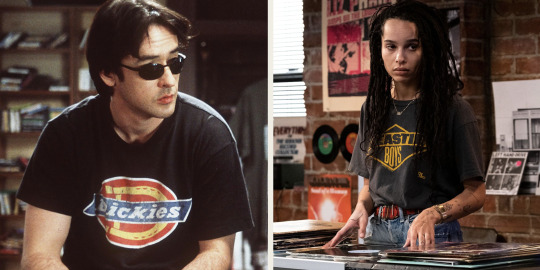
It’s easy to forget now that at the beginning of 2020, before the pandemic had taken hold of our consciousness, for a brief moment, High Fidelity was back. Not only did Nick Hornby’s debut novel and Stephen Frears’ film adaptation celebrate major milestones this year — 25th and 20th anniversaries, respectively — but a TV adaptation premiered on Hulu in February. In light of all of these arbitrary signposts, multiple thinkpieces and remembrances litigated Hornby’s original text on familiar, predictable grounds. Is the novel/film’s protagonist Rob actually an asshole? (Sure.) Does Hornby uphold his character’s callous attitudes towards women? (Not really.) Hasn’t the story’s gatekeeping, anti-poptimist approach to artistic taste culturally run its course? (Probably.) Why do we need to revisit this story about this person right now? (Fair question!)
Despite reasonable objections on grounds of relevancy, enough good will for the core narrative—record store owner seeks out a series of exes to determine a pattern of behavior following a devastating breakup—apparently exists to help produce a gender-flipped streaming show featuring updated musical references and starring a decidedly not-middle-aged Zoë Kravitz. I only made it through six of ten episodes in its first (and only) season, but I was surprised by how closely the show hewed to High Fidelity’s film adaptation, to the point of re-staging numerous scenes down to character blocking and swiping large swaths of dialogue wholesale. (Similarly, the film adaptation hewed quite close to the novel, with most of the dialogue ripped straight from Hornby.) Admittedly, the series features a more diverse cast than the film, centering different experiences and broadly acknowledging some criticisms of the source material regarding its ostensibly exclusionary worldview. Nevertheless, it seemed like a self-defeating move for the show to line itself so definitively with a text that many consider hopelessly problematic, especially considering the potential to repurpose its premise as a springboard for more contemporary ideas.
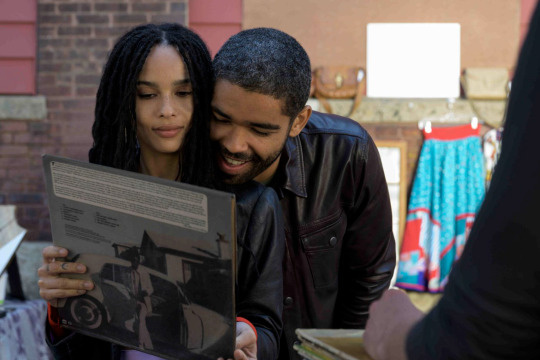
High Fidelity’s endurance as both a piece of IP and a flashpoint for media discourse is mildly baffling for obvious reasons. For one thing, its cultural milieu is actually dated. Even correcting for vinyl’s recent financial resurgence, the idea of snooty record store clerks passing judgment on customer preferences has more or less gone the way of the dodo. With the Internet came the democratization of access, ensuring that the cultivation of personal taste is no longer laborious or expensive, or could even be considered particularly impressive (if it ever could have been). Secondly, as one might imagine, some of Hornby’s insights into heterosexual relationships and the differences between men and women, even presented through the flawed, self-deprecating interiority of High Fidelity’s main character, are indeed reductive. Frears’ film actually strips away the vast majority of Hornby’s weaker commentary, but the novel does include such cringeworthy bits like, “What’s the deal with foreplay?” that are best left alone.
Accounting for all of that, though, it’s remarkable how many misreadings of Hornby’s text have been accepted as conventional wisdom. It’s taken as a given by many that the novel and film earnestly preach the notion that what you like is more important than what you are like when, in fact, the narrative arc is constructed around reaching the opposite conclusion. (The last lines of the novel and film are, literally, “…I start to compile in my head a compilation tape for her, something that's full of stuff she's heard of, and full of stuff she'd play. Tonight, for the first time ever, I can sort of see how it's done.”) That’s relatively minor compared to the constant refrain that Rob’s narcissism goes uncriticized, even though the story’s thematic and emotional potency derives from what the audience perceives that Rob cannot. To put it bluntly, High Fidelity’s central irony revolves around a man who listens to music for a living being unable to hear the women in his life.
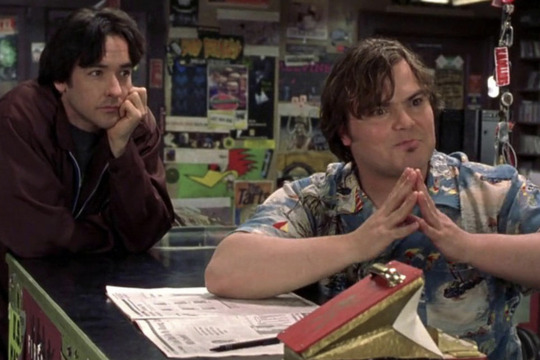
While Hornby’s prose immerses the reader in Rob’s interior monologue, providing ample room for the character to spout internal justifications of his behavior, the novel hardly obscures or conceals this conclusion. Moreover, the film makes it unavoidably explicit in numerous scenes. Rob (John Cusack) triumphantly pantomimes Rocky Balboa’s boxing routine soundtracked to Queen’s “We Are The Champions” after his ex-girlfriend Laura (Iben Hjejle) confirms she hasn’t yet slept with her new boyfriend Ray (Tim Robbins), but doesn’t hear the part where she says she prefers to sleep next to him. When Laura informs Rob that she did eventually sleep with Ray, Rob completely falls apart. In an earlier, more pointed scene, Rob goes out with his ex-girlfriend from high school (Joelle Carter) to ask why she chose to have sex with an obnoxious classmate instead of him. She venomously informs him that he actually broke up with her because she was too prudish, an abrupt, cruel bit of business we actually witness at the film’s beginning. It was in her moment of heartbroken vulnerability that she agreed to quickly sleep with someone else (“It wasn’t rape because I technically said, ‘Okay,’ but it wasn’t far off,” she sneers), which ultimately put her off sex until after college. Rob doesn’t hear this explanation or the damning portrait of his teenaged self. Instead, he’s delighted to learn that he wasn’t actually dumped.
These are evidently low character moments, one’s that are comedic in their depiction of blinkeredness but whose emotional takeaways are crystal clear, and one’s that have been written about before. My personal pick from the film, though, comes late when Rob attends Laura’s father’s funeral. He sits in the back and, in typical fashion, turns to the camera to deliver a list of songs to play at his funeral, concluding with his professed wish that “some beautiful, tearful woman would insist on ‘You’re The Best Thing That Ever Happened to Me’ by Gladys Knight.” It’s a really galling, egotistical moment that still makes me wince despite having seen the movie umpteen times. Yet, it’s immediately followed by the casket being lowered to the ground as Laura’s sobs ring out in the church. In a movie defined by John Cusack’s vocal timbre, it’s one of the few times when he completely shuts up. From two-thirds down the center aisle, Frears’ camera pushes into Cusack’s face until tears in his eyes are visible, but what you really see is an appropriately guilt-ridden, ashamed expression.
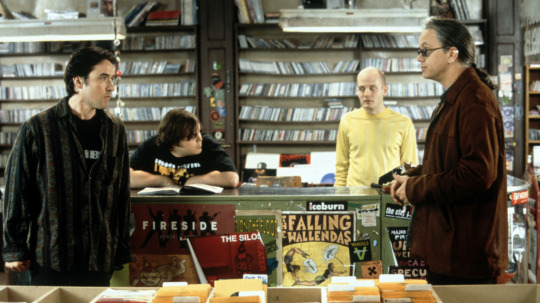
However, none of this evidence carries any weight if your objection to High Fidelity is that Rob suffers no material consequences for his behavior. While Rob is frequently called out for his actions, he is never actively punished. He doesn’t, say, receive a restraining order for continually calling Laura after they’ve broken up or end up alone mending a permanent broken heart because of his past relationships. By the end, Rob and Laura get back together and Rob even starts an independent record label on the side. It’s a stretch to characterize Hornby’s High Fidelity as a redemption tale, but it is a sideways rehabilitation narrative with a happy ending that arises at least partly out of mutual exhaustion.
Those two elements—Rob’s asshole recovery and the exhausted happy ending—rarely seem to factor into High Fidelity discourse. Granted, there’s credence to the idea that, socially and culturally, people have less patience for the personality types depicted in High Fidelity, and thus are less inclined to extend them forgiveness, let alone anything resembling retribution. I suppose that’s a valid reaction, one against which I have no interest in arguing, but it’s somewhat ironic that High Fidelity has endured for reasons that have nothing to do with its conclusions regarding inflexible personal principles and the folly of escapism. Both the book and film are specifically about someone who slowly comes to terms with accepting reality rather than live in a world mediated by pop cultural fantasies whose unrealistic expectations have only caused personal suffering. It’s not unfair to characterize this as a fairly obvious epiphany, but considering we currently live in a world dominated by virtual echo chambers with an entertainment culture committed to validating arrested adolescence, it retroactively counts as “mature” and holds more weight than it otherwise should.
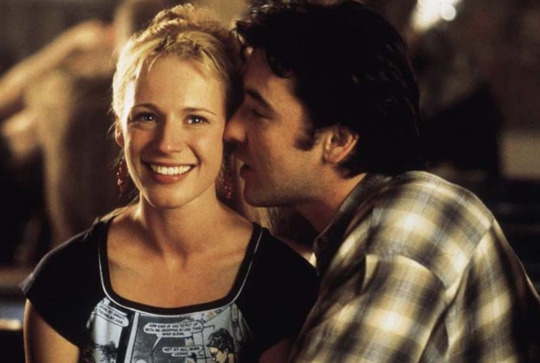
Near the end of High Fidelity, the book, after Rob and Laura have gotten back together in the aftermath of Laura’s father’s death, Hornby includes a chapter featuring five conversations between the couple unpacking the state of their relationship. During the third conversation, Rob and Laura fight about how she doesn’t care about music as strongly as he does, catalyzed by Rob’s objection to Laura liking both Solomon Burke and Art Garfunkel, which, in his mind, is a contradiction in terms. Laura finally admits that not only does she not really care about the difference between them, but that most people outside of his immediate circle of two don’t care about the difference, and that this mentality is indicative of a larger problem. It’s part of what keeps him stuck in his head and reluctant to commit to anything. “I’m just trying to wake you up,” she says. “I'm just trying to show you that you've lived half your life, but for all you've got to show for it you might as well be nineteen, and I'm not talking about money or property or furniture.”
I fell for High Fidelity (first the movie, then the book) as a younger man for the reasons I assume most sensitive-cum-oblivious, culturally preoccupied straight guys do: it accurately pinpoints a pattern of music consumption and organizationally anal-retentive behavior with which I’m intimately familiar. I spent the vast majority of my early years listening to and cataloguing albums, and when I arrived at college, I quickly fell in with a small group of like-minded music obsessives. We had very serious, very prolonged discussions filled with impossibly strong opinions about our favorite artists and records. Few new releases came and went without them being scrutinized by us, the unappreciated scholars of all that is righteous. List-making wasn’t in vogue, but there wasn’t a song that passed us by that we didn’t judge or size up. I was exposed to more music during this relatively short period of time than I likely will ever absorb again. Some of these times were the most engaging and fun of my life, and I still enjoy discussing and sharing music with close friends, but I’m not such a true believer to fully feel comfortable with this behavior. It’s not entirely healthy on its own and definitely alienating to others, and there comes a point when you hear yourself the way a stranger might, or maybe even catch a glimpse of someone’s eyes when you’re midst rant about some stupid album, and realize, “That’s all there is of me. There isn’t anything else.”

This is what Rob proclaims to Laura in the conversation when she tells him she was more interested in music during their courtship than she is now. It’s a patently self-pitying statement on his part that doesn’t go unchallenged by her in the moment or bear fruit in the rest of the novel. Yet, it’s this type of uncomfortably relatable sentiment that goes under-discussed. If High Fidelity will continue to have a life well after its cultural moment has passed, then it’s worth addressing what it offers on its own terms. Near the end of the book, Laura introduces Rob to another couple with whom he gets along quite well. When the evening comes to an end, she tells him to take a look at their record collection, and it’s predictably filled with artists he doesn’t care for, e.g. Billy Joel, Simply Red, Meat Loaf. “'Everybody's faith needs testing from time to time,” Laura tells him later when they’re alone. Amidst Rob’s self-loathing and sullen pettiness, Hornby argues that one should contribute in some way rather than only consume and that, at some point, it’s time to put away childish ideas in order to get the most out of life. It’s an entirely untrendy argument, one that goes against the nostalgic spirit of superhero films and reboot culture, but it doesn’t lack merit. Accepting that some values aren’t conducive to a full life, especially when it’s shared with someone else, doesn’t have to mean abandoning interests or becoming an entirely different person. It just means that letting go isn’t an admission of defeat.
It’s why I’ve always found the proposal scene in the film to be quite moving, albeit maybe not specifically romantic. It plays out similarly in both the book and the film, but the film has the added benefit of Cusack and Hjejle’s performances to amplify the vulnerability and shared understanding. Laura meets Rob for a drink in the afternoon where he sheepishly asks if she would like to get married. Laura bursts out laughing and says that he isn’t the safest bet considering he was making mixtapes for some reporter a few days prior. When asked what brought this on, Rob notes that he’s sick of thinking about love and settling down and marriage and wants to think about something else. (“I changed my mind. That’s the most romantic thing I’ve ever heard. I do. I will,” she sarcastically replies.) He goes on to say that he’s tired of fantasizing about other women because the fantasies have nothing to do with them and everything to do with himself and that it doesn’t exist never mind delivering on its promise. “I’m tired of it,” he says, “and I’m tired of everything else for that matter, but I don’t ever seem to get tired of you.”

This sort of anti-Jerry Maguire line would be callous if Laura didn’t basically say the same thing to him when they got back together. (“I’m too tired not to be with you.”) It’s possible to read this as an act of mutual settling, but I always thought Hornby’s point was personal growth and accepting one’s situation were intertwined. The key moment in High Fidelity, the film, comes when Laura finds Rob’s list of top five dream jobs. (In the book, Laura makes Rob compile the list.) At the bottom of the list, after such standard choices like music journalist and record producer, lies architect, a job that Rob isn’t entirely sure about anyway. (“I did put it at number five!” he insists.) Laura asks Rob the obvious question: wouldn’t you rather own your own record store than hypothetically be an architect, a job you’re not particularly enthused with anyway?
It’s Laura who convinces Rob that living the fifth-best version of your life can actually be pretty satisfying and doesn’t have to be treated like a cruel fate worse than death. Similarly, Rob and Laura both make the active decision to try to work things out instead of starting over with someone else. Laura’s apathy may have reunited them, and Rob’s apathy might have kept him from running, but it’s their shared history that keeps them together. More than the music and the romance, High Fidelity follows the necessary decisions and compromises one has to maneuver in order to grow instead of regress. “I've been letting the weather and my stomach muscles and a great chord change in a Pretenders single make up my mind for me, and I want to do it for myself,” Rob says near the end of Hornby’s novel. High Fidelity’s emotional potency lies in taking that sentiment seriously.
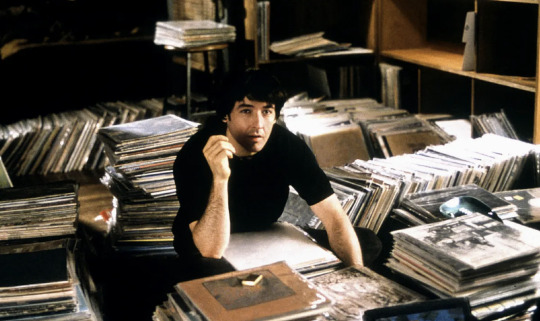
#high fidelity#nick hornby#stephen frears#john cusack#zoe kravitz#90s films#oscilloscope laboratories#musings#beastie boys#music#music movie#vinyl#vinyl film#jack black#tim robbins#adam yauch#vikram murthi#film writing#Film Criticism#hulu#reboot
40 notes
·
View notes
Text
About Chris “Kirbopher” Niosi
Okay, so I guess I never fully went into this before because my story seems like so little compared to other people, but I hope that this helps you to understand that his behavior is a pattern, not just individual bad decisions.
So hi! My name is Caelia. My main art blog is @caeliamer (same as my username everywhere else) but I’m choosing to focus on art on that blog, so I’m writing this here. If you’ve been following Kirb for a long time, you might remember me as “Prismaya”, the name of one of my characters that I used to use as an alias when I met Kirb in 2004. Prismaya appeared in the original TTA (the result of a fan art contest) and even had a cameo in TOME (because I threw money at him for season 2).
Kirb was always the kind of person I wanted to give the benefit of the doubt, in part because of his age. I practically watched that dude grow up from the age of 15. Much of his bad behavior I just kind of dismissed for a long time because “lol teenagers”.
And of COURSE Kirb got pulled into what I’ve deemed in my head to be the “Psyguy Cult of Circular Abuse”. Psy had a platform, and Kirb, not unlike Psy, was always trying to rub elbows with people with larger platforms than himself.
When it came to conflict between anyone in the group, Kirb would pretty much always side with the person with the bigger platform. This resulted in a significant amount of unchecked abuse within this group, much of which involved minors.
When allegations against Psyguy came out in 2014, Kirb was one of the only people in that circle that kept silent, then gave a half-assed testimony (after being dragged into it), then backpedaled to throw Psyguy’s victims under the bus to save his OWN image.
So we already know JUST from the Psyguy debacle that Kirb is more worried about his image than protecting vulnerable people. What else do we have to work with?
I remember firsthand when Kirb was abusive to John M. John was just trying to learn animation and storytelling and took inspiration from Kirb’s work (which was ALREADY derivative of SO MANY THINGS), and Kirb said some horrible nasty things to him and about him because he felt threatened (which was ridiculous). He said once in an AIM chat that he hoped that John would just give up on animating entirely so that Kirb “wouldn’t have to put up with him” anymore.
Speaking of animations, y’all remember nin10doh? Kirb actually earned money from those animations through Newgrounds. Supposedly he paid the animators (though I’ve heard differently from other sources so that’s up in the air afaik), but you know who didn’t get paid?
His voice talent!
I was the voice of Peach in the first nin10doh collab, and many people I still keep in touch with were also voice actors for that and other animations Kirb financially profited from. None of them got paid.
And speaking of nin10doh, I recorded lines for its sequel, s00pah nin10doh (god these names are so fucking stupid, even for the time). Several months after I had recorded Peach’s lines, Kirb messaged me and was like “hey uh sorry but I’m going to replace you with [famous voice actor] as Peach’s voice actress. Unlike you, she’s a REAL voice actor. You understand, riiight?”
Like what the heck was I going to say to that. I tried to be understanding and not show hurt feelings, but it really hurt. Not because I felt entitled to the role, but because he kicked me from a role that was supposed to be just for fun so that he could shove a well-known name into his project to give it some form of “legitimacy”, I guess?
This was the start of some bullshit. The more Niosi got to know other people in the VA and animation industry, the more important they became vs his other friends. Around that time (2008-2011), having him in a call was almost unbearable because all he ever wanted to talk about were his voice actor/celebrity friends and brag about all the contacts he was making. It got to a point where, again, people with larger platforms were prioritized over others. This was the case both socially and with his animation projects. When he DID talk to us “little people”, it became obvious that he was more interested in hearing our praise than being our friend. For example, he would show us stuff that HE was working on or art that HE did, but if we showed our stuff, he didn’t show any interest .
My (already fairly infrequent) interactions with Kirb became rather spotty, until one day in 2011(?), Kirb became very VERY interested in talking with me all of a sudden. He got me and another friend of mine that he rarely talked to in a call.
I thought at first, “hey, this is nice, kirb’s making time for other friends. Maybe he’s growing.”
Not so!
See, he contacted us because his usual friends weren’t talking to him.
Because he was being an angry, whiny, entitled asshole after his ex Audrey broke up with him and everyone was FUCKING TIRED OF HEARING IT.
So he spent several hours whining about his ex, telling us how terrible she was (which by the way is a classic move for an abuser), and then showed off his animation thesis to us like it was a big freaking deal. Which was ironic because much of the animation for that thesis was done by Audrey, but he neglected to mention that.
He didn’t show any interest in how we were doing or what we were doing or showed any indication that we were people he gave even the slightest shit about. That call, like so many things, was the Chris Niosi show.
Kirb basically used me and my friend to perform emotional labor for him and provide asspats because he couldn’t handle the fact that he was being a fucking dick. And we went along with it, not really realizing what was happening until it was over.
And THAT was legitimately the last time he ever deigned to speak to me. But it wasn’t because I was unfriendly to him. I tried casual conversation via twitter. I did fan art for TOME. I donated to TOME season 2. I always...ALWAYS gave Kirb the benefit of a doubt until he threw Psyguy’s victims under the bus in 2014, as mentioned above.
He has used MANY people to get where he is. He has financially benefited from the free labor of talented people. He has ridden the coattails of industry professionals. He has crossed picket lines to take jobs from striking voice actors. He takes advantage, he takes credit, he takes money, he takes control. Everything is about him and his image. Yes, even these so-called “apologies” he’s putting out right now. Apologies that completely gloss over the worst things he’s done.
But I’m writing about my experience - my VERY LIMITED EXPERIENCE. People that have lived with him or dated him or simply spoke to him more often have stories that line up with this horrible behavior, and I am begging you to listen to them and take them seriously.
68 notes
·
View notes
Text
Wolf 359 Classpects, pt. 1
Soooo, while I was still busy with the last few weeks of my summer internship, I did keep thinking about classpecting the Wolf 359 cast. Possibly too much, because it wouldn't leave me alone until I'd solved my own God Tier riddle. Unfortunately, it got really long in the solving because I have many Thoughts and want to share all of them, always, so uh, a complete Classpect Analysis of Wolf 359 will be in parts? This first one covers Eiffel's, Hera's, Lovelace's and Minkowski's aspects.
DOUG EIFFEL: An utter no-brainer; ya boi Dougie Fresh is a Breath player if I ever saw one. For Chrissakes, he's the communications officer, and the first one to start complaining about the monotony of being stuck in a deep space sardine can. Breath is associated with communication, freedom, openness, and change - "free as the breeze", you might think of it, but that also leads to Breath players having trouble pinning themselves down to anything. They get skittish if they feel pinned down, and frustrated when stuck in place. Doug's noncommittal aloofness, the way he's off in his own little world (partially to hide from the fact he really does not like himself very much at all), and the way he's incorporated media into his self-perception all match pretty well with John and the Nitrams. But at the same time, he's the one playing mediator even as early as The Sound And The Fury. Being largely outside of the War Industrial Complex the other characters are so familiar with and thus mostly free from its dogmatic worldview of hierarchy and order, he's becomes the One Sane Man when he's the one to shout "what is WRONG with you people?" when "murder" shows up in the top 3 potential solutions to a problem, and he has no hesitation in saying what's on his mind. And it's not all complaints and bad ideas, either; he's got whole speeches telling the others how amazing he thinks they are and how in awe he is of their skills. A key catalyst in the plot of Wolf 359 is the reaching effects of his radio broadcasts. Also, there's something hilarious to the fact that for the aspect associated with communication, Doug *literally* cannot lie to save his life. I kept my ears open for the infamous Breath Hex on my second listen - that is, the strange little way in which things Breath players say tend to come to pass in reality. Cigarette Candy is basically 20 straight minutes of the Decima virus being Breath Hexed into existence, and he guessed Lovelace's situation in one - "Maybe she's a clone, or like a *really* good robot replica."
HERA: Another easy one. Although Hera is resistant to splintering as we've come to recognize it, Heart players are nothing if not determined to be an individual. They have a firm idea of themselves as a person and defend it fiercely, including compartmentalizing away pieces that don't fit their self-image. Maybe less actively putting them down like Jade Harley did to Jadesprite (the manifestation of the negative feelings she repressed out of fear they'd make her less useful) - that would mean attacking or denying a part of themselves - and more... "why yes, I put this part of myself in this box, and I may look at the box on occasion, the box definitely exists, but I don't go near the box and I definitely do not touch or open or interact with the box. And then one day, I will die." So that piece finds other avenues to express itself because it can't not do that. Hera's programming dictates she be "chipper and non-confrontational and always ready to help", but she actively resists being a mere utility and always has - her earliest know action was to attempt a jailbreak of the manufacturing facility she was made in, born rebel that she is. She will insist upon her name over her serial number unless you force her not to, and gets passive-aggressive at people treating her like a machine. And yet, even as she teaches herself to ignore commands literally written into the base of her personality, she doesn't reject her directive to be helpful, nor does she express a wish to be a flesh-and-blood human, or even really to have a physical form? She has a human self-image in mental spaces (we presume, I will semi-seriously point out there's nothing definitively stating she doesn't see herself as like, her fursona or something), but when she has to limit herself to a human-like view of the ship, her immediate reaction is "this is weird, I don't like it." This is honestly something about Hera that I think may be unique among non-villainous AI characters; she seems to be content with being what she is in general, and she just wishes for people to treat her as a person and not a piece of equipment they can do with as they please.
ISABEL LOVELACE: Arm-wrestled Hera for the Heart aspect and lost, despite Hera not actually having any arms, but that's okay because there's two aspects that fit her much better: Blood and Time. I ultimately went with Blood.
This is the part where you notice I'm onto the third of four characters in an aspects-only meta post, yet there is still a lot of post to go. This is because These Kinds Of Characters, the sort that're constantly on emotional lockdown, are a Challenge Mode, and for me to truly be satisfied with my classification I have to start drilling into the bedrock of what it even means to have an aspect in general, what it means to have a specific aspect, and what each aspect is really about. When you're on that level you tend to find yourself throwing out explicit expositional statements as incomplete, oversimplified, or unreliable, and looking at the text directly with a subtextual electron microscope. Brace yourselves. I have thrown the author out of the airlock, and I am about to get verbose.
Lovelace's character sheet describes her in contradictions, and we get to see two different sides to her that resolve into the complete picture by the time Lovelace Mk. III wakes up. There's Captain Isabel Lovelace, goofing around in her earlier logs, and The Terminator. She does things Her Way and is very much prepared to fight you if you object - the whole reason she was picked for the Hephaestus mission was her willingness to go against (in her words) "stupid orders" and do what she thought was right. She's also fiercely loyal; The Terminator is the end result of her anger and grief for her lost crew and at her failure to get them home alive. Her backstory episode has her summing up her complicated relationship to the Air Force with "I owe a lot of who I am to them." And even before she and Minkowski have completely stopped butting heads, Lovelace shoves her out of the way of an exploding wall panel that would've killed her, and takes a near-fatal bit of shrapnel to the gut in the process. At her best, Lovelace is a fearless, boundlessly determined, dedicated firebrand of a leader. At worst, she can be impatient, stubborn, shortsighted, and ruthless. I dunno about you but that reminds me of a certain... angry crab that I know.
"Time" was what a few people chimed in with for Lovelace and while I see some of the connections (her awareness of the time loop, "Variations on a Theme", her multiple selves and multiple deaths, the repeated motif of clocks and pocketwatches) I don't think she quite fits in with the other Time players. Unlike most Time players, she doesn't have a fixation with historic context, the "Why Things Are The Way That They Are." This manifests in Dave's paleontology and his taking of source material for ironic twisting, Aradia's archaeology and knowledge of The Nature Of The Game, Damara's... /noises and vague gestures bc I don't want to go back through Meenahbound but her role as The Handmaid fits the pattern, and Caliborn's own warped, thoughtless replication of narrative archetypes. Context. Decisions. What came before and how it shapes the now, where your decisions will take it from here. The consequences those decisions will have. The details versus the larger picture. Even failure has its place in that scheme - that's the Time aspect. Lovelace doesn't like to dwell, she's a very "barrelling forward momentum" kind of person.
Side note: Aradia, Dave, and Damara all face hesitation to take action they had to learn to overcome. Also, all of them had to be pushed to use violence except in self-defense; Aradia let Vriska cross a series of lines before beating the everloving shit out of her, and Damara snapped after what, years? Of Meenah's abuse. Dave, on the other hand, never raises a hand to another person except as a complete necessity. Caliborn is, if anything, an aberration here in that he's outright homocidal and self-doubt is something that happens to other people. Caliborn is an outright aberration to a lot of Time player patterns, and to SBURB in general, because it's SBURB, so the rules are made up and the points don't fucking matter, except when they do, because Fuck You, The Author Said So.
No, Lovelace's approach to decision-making is that regrets are for afterwards, and "if I fail I deserve to be out of this picture; also, this situation has gone entirely pear-shaped, time to fling myself into the sun." (and that sounds an awful lot like someone that I know very well, but I'll deal with that royal mess when I get to the crazy whamma-jamma that is Classes). Impatience and railroading of other people can be her undoing just the same as assertiveness and decisiveness are her gifts.
...aaand then I went ahead and watched the live episode and yeah, major Karkat vibes there. However, I note that I don't believe we have ever hit hard evidence in Homestuck that Blood players are capable of Chilling The Fuck Out - this is part of the limitations of classpecting characters who weren't made for this system, you really have to dig into how much of their behavior is situational and where you see the kernel of individual perception shine through, the Rosetta Stone by which you begin to see the constants. "Where the object becomes the subject", to quote Memoria.
Finally, I think it's also worth noting that while Lovelace has a lot of connections to Time motifs, she also has connections to a lot of Blood motifs that arguably become more important to her story. Personal bonds and social justice are two of the Blood aspects strongest associations - see Lovelace's loyalty to her crew, and extending her desire to avenge them out to everyone Goddard Futuristics has ever used and tossed aside. The physical body and literal blood are other strong associations, and gee, how many times does the O-negative Cure-All Alien Juice in Lovelace's veins become a critical plot point? Not to mention the implication that her new friends all pulled through the finale because all of them now have her blood in their system. I'll accept that she's closer to the line between Blood and Time than some, but I'm holding by ground here:

(Also, here's some irony for you, she may share an aspect with the Cancer trolls, but her birthday is August 11th, making her a Leo.)
RENEE MINKOWSKI: Minkowski was the hardest of these 4 to come to a decision on. My first inclination was Mind. Her general disposition put me in mind of a Life player. But then, I sat down and thought my way past the Commander's layers of emotional armor and ultimately settled on Light.
First off, by being a stickler for protocol and procedure as well as an Actual Responsible Adult, Minkowski is a kind of character that Homestuck straight-up just does not have, so snap judgements aren't gonna cut it here. This is, again, another limitation of the classpecting system - all the examples we have to draw from are teenage disasters stuck in a lawless hellscape of some description or another, and written by an author allergic to boxing himself in with hard conclusions. But I digress.
Commander Minkowski is also stubborn. When she sets her mind to something, she digs in her heels, cranks the dial to 11, and then breaks off the knob and pockets it so you can't turn it back down. We see this as soon as episode 2, and at it's most hyperbolic when she Captain Ahabs the plant monster. Her's is iron-willed, bloody-minded, unstoppable, Determi-fucking-nation - when she sets her mind to it.
The submarine thought exercise is what had me initially lock her down as a hero of Mind before I mulled it over. The exercise is meant to provoke thought about priorities - what you think your role's purpose is in that situation will determine your priorities, and thus, your decisions. Mind heroes' most prominent skills are in riding the flow of causality, watching decisions, their causes and their consequences, and directing that path. They know people, and how to direct people. But the need for this means that they can get a little co-dependent. Other people are understandable - it's themselves that Mind heroes have the greatest struggle with. Without that vehicle of another person, Mind heroes may find themselves adrift and struggling to define themselves. This is fitting, given Mind is the most direct counterpart to the Heart aspect.
However, upon further examination, I found that this framework of priorities setting your decisions can also be extended to the Light aspect. What is "lucky" in a given situation? What do you define as a fortunate outcome? Rose arguably gets Grimdark'd by something like this, she asks the cue ball "are the horrorterrors evil?" and in doing so attempts to pry into the motivations and intent of *indescribable eldritch beings existing on a nigh-incomprehensible plane* and wedge it down into a relative human understanding of morality, which is sort of like trying to fit the Pacific Ocean into a water bottle. She was trying to deduce what impact the horrorterrors would have upon her and her friends, but asked the wrong question and got an answer she couldn't handle. She didn't recognize Doc Scratch was baiting her into this by leading her into a specific framework through which to ask the question. Vriska died because of her failure to recognize she was in a situation where luck didn't matter. Aranea got trounced because of her inability to recognize that reshuffling reality to prioritize herself and her preferred outcomes still didn't overcome the fundamental nature of timelines - you try to take over the alpha timeline with an insubordinate branch? That's a doomed timeline no matter how you slice it, and we know what happens to those. Luck and knowledge are both used by the Light-bound to give themselves power, whether in showing themselves off as The Smart One or the The Helpful One or The Unstoppable One, but their limited viewpoint often leads them to overlook the limitations of their own framework, or in other words, missing the bigger picture. I'll point out here also how Minkowski has the entire DSSPPM memorized and is the one who wants to get to the bottom of whatever the hell is really going on up at Wolf 359. Additionally, one of her other ambitions, at least once upon a time, was writing musicals. The verbal arts are one of the domains of Light players.
So while on the surface, Minkowski bears the most resemblance to a Life player, Life players tend to have an element of conformity to them. Unquestioned assumptions they've internalized have about the context in which they exist. Light heroes, on the other hand, need conformity so they have something to defy when they jump up and down screaming LOOK AT ME!
So after much pontificating, I came to a decision. In the end, what Minkowski wanted more than anything else was a stage. Maybe to direct rather than hold the spotlight, but still; that's a Light hero if ever I saw one.
28 notes
·
View notes
Text
Jack in the box
If I am doing this wrong or you don't want to be tagged in this post, please let me know and how to fix it. @metafest @letswarriorfangirl @amwritingmeta @emblue-sparks @angelneedshunter @verobatto-angelxhunter @magnificent-winged-beast @staycejo1
I needed to take a bit to get my thoughts more in order, I should have done that before I made that rambling post before. Anyway, there seemed to be a few themes in this episode- One is about the similarities and differences in the characters, and how they are destined to repeat history because of it.
For example, Dean is just as prone as Jack to reaching a point of emotional meltdown and saying/doing things when he is angry, afraid or hurt that he shouldn’t and that hurt the people he loves, the only difference is that Dean isn’t a two year old and teenager at the same time, the two stages in a person’s life when they have very limited self-control, and Dean doesn’t have Jack’s powers. If Dean was as powerful as Jack, he would have destroyed the universe long ago in one of his meltdowns.
The parallel between Dean and Duma is obvious, so I won’t go over that one. But there is also a parallel between Dean and John. The first time Mary was killed, John basically did the same thing Dean is doing now- he went looking for revenge on Azazel and was so blinded by it that he couldn’t see he was basically doing to his kids and Dean hasn’t seen how he is following the same path as John. John basically locked Sam and Dean in a metal box (though Baby is a much nicer metal box) or in cells in the form of hotel rooms alone where they had very limited exposure to other people and had very little reference for normal human behavior and healthier ways to deal with things, and expected them to behave like adults when they were just children. He didn’t accept that they were kids who would make mistakes, he always expected them to follow orders, behave as adults and it put an incredible amount of pressure on them, especially Dean. He basically set Dean up to feel like mistakes were unforgivable and accidents should be harshly punished, except when Sam made them, and even then, Dean may not have wanted to kill Sam, but he did lock him in a metal cell (a much bigger, more comfortable one, but still a cell) and when he let him out, he spent months reminding him over and over again of his mistake and making him feel like crap about it. Also Dean looked up to John and wanted his approval so much that he let himself be manipulated, he accepted blame and guilt for things that should never have been put on him (he should not have been left to protect Sam from a monster when he wasn’t even ten years old yet) and was willing to do anything John said to get his approval, and he never felt like he got it.
Jack has been shown doing all sorts of things to indicate that he wants Dean’s approval, he sees him as a father (he asked to go fishing because he said Dean told him about fishing with his father, and he mimicked Dean all the time) and at the moment, it looks like he may not get Dean’s approval. He wants so badly to meet these expectations that shouldn’t be put on him because he is essentially a toddler, and as we have seen, having all the pressure of those expectations proved to be too much. I don’t think that Jack killed Mary out of wrath, he never wanted her to die, he was just in a panic and having a meltdown because of the overwhelming fear of falling short of Dean’s expectations when Dean found out. I don’t think he ever wanted to hurt her, he had an emotional meltdown normal for anyone as young and under as much pressure as Jack has been, and unfortunately when he has a meltdown it’s like an atom bomb going off, and Mary was just in the blast radius.
I just read a fic on Tumblr that pointed out that someone with glowing yellow eyes was responsible for Mary’s death both times, and both times she died trying to protect a child, but that is where the similarities ended. Azazel was a centuries old Demon, intent on malice who consciously chose to kill her in a painful, slow way and she stayed in that house as a ghost, unable to move on. Jack killed her by accident, he never wanted to hurt her, he didn’t plan on it, he loved her, and her death was instant, and she did go straight to heaven. Dean may subconsciously be seeing the parallel of Azazel and Jack both killing her, driving his urge to kill Jack in revenge, but not seeing any distinction beyond that, not caring that it was an accident made by someone who lacked the maturity, experience and self-control. All he can see is that he lost her again and he is hurting.
Sam on the other hand, is like Jack in that he was different from his family and everyone he knew, first in that he was highly intelligent and didn’t want to be a hunter, and then later when he learned about what Azazel did to him when he was a baby. He felt trapped by his family and expectations and he was desperate to get out of the metaphorical Malak box he was in, and he also found a way to escape. And we have seen him relate and sympathize with others who know they are different and have the expectations of others pushed on them but want to not be what the world sees them as. He even told Jack that he understood how he felt because he was in a similar situation growing up, this was why he was Jack’s ‘go to man’. He can also relate to having Lucifer be way too interested in him.
Sam also parallels Dean in this episode in that he cares deeply about Jack, he has been trying since Jack’s birth to be there for him and try to give him at least some normalcy in any way he could, he protected him and stood between Dean and Jack in the beginning when Jack hadn’t even done anything yet and Dean wanted to kill him just for existing. After Jack killed Mary, he still wants to help and protect Jack, but he finds himself in the same position Dean was in when they were growing up that Dean mentioned in Prophet and Loss when he said he knew that it seemed like he took John’s side a lot growing up, but he was just trying to keep the peace. Sam caved and went along with this scheme of Dean’s even though he hated it, the same way Dean backed John up when they were kids a lot of the time.
Dean does have a history of deceit and manipulation prior to this episode, mostly with Sam, and I think Sam remembers how Dean manipulated him in the past to say yes to Gadreel and essentially forced him to take his soul back regardless of what Sam want. He took away Sam’s free will. Dean also has a history of being a hypocrite, saying free will is all important, until it means he might lose someone, and then it’s negotiable. Sam knew this about Dean, Dean has done very similar things to Sam in the past, but when Dean asks him to help do the same to Jack, he goes along with it, allows Dean to manipulate him into taking part and in turn manipulate Jack, probably in the same manner that John would use Dean and Sam’s trust in Dean to get Sam to do what John wanted. Sam is basically stuck in the middle.
Jack parallels Sam in that he trusted Dean and Sam and allowed them to lock him in the box the way Sam allowed Dean and Bobby to lock him in the panic room, and later when he trusted Dean and Dean tricked him into saying yes to Gadreel. He wants Dean’s approval the way Sam does, and he trusts Sam and Dean to the point that he allows them to manipulate him. There is a metaphorical similarity also in the way Sam escaped John, Dean, and the prison of his life by getting out and going to Stanford, the way that Jack escaped the prison that Dean and Sam locked him in.
There is even a parallel between Jack and Chuck, and kind of between Dean and Chuck. The things that Jack did to the professor, televangelist and pastor were all acts from the Old Testament, reminding us that God/Chuck didn’t always write books in his underwear and wasn’t always as mellow and forgiving as he is now, and more prone to making rash decisions and punishing people a lot more harshly. Even Chuck/God was prone to immaturity and lashing out when he was young, but he learned from it and got better. Hell, he flooded the entire earth once because he didn’t like the way people were becoming, and he burned an entire city to the ground and turned a woman to salt, *just because she looked over her damn shoulder*.
The other theme is about blame, assigning blame and forgiveness. One of the first things Duma said to Jack that made him so easy to manipulate was, “It’s not your fault.” Dean challenged both Cas and Jack by asking “So this was her/our fault?!” Because Dean needs it to be someone’s fault, he needs someone to blame. If he can feel like someone is at fault, he can take action and feel justified in it. Not that he felt it was Mary’s or their fault, he just wants someone else to say it was, someone he already blames/blamed. Last episode he was convinced it was Cas’s fault.
Another pattern is being so desperate for absolution and forgiveness so badly that you are willing to blindly trust people when you shouldn’t, the way Jack is so easily swayed by Duma just because she said it wasn’t his fault. When he met her before, it wasn’t actually her, it was the Shadow, trying to take him away to the Empty and making that horrible deal with Cas. All of his experience with her outward appearance should have been enough to make him distrust her. We see it again later when he goes into the church and promises the congregation that he will take them to heaven and make them angels and they just blindly follow him. He might as well have been a stranger in a van offering them candy. Along that same theme, there is the way the people who show doubt or question are treated. Even though Chuck said it was okay not to believe in him because he included free will in the kit, Duma convinced Jack that it was right to punish the atheist professor by turning him to salt, and Jack later tortured the pastor for questioning him. I believe that the reason Chuck included free will in the kit was that he learned with Adam and Eve that a little bit of skepticism is a good thing, otherwise they wouldn’t have been so easily tricked by Lucifer in the Garden.
Last of all, not a theme of the episode, but did Bobby seem weird to anyone else? I can’t decide if it was just weird writing, or intentional because he is the AU Bobby who doesn’t have the same history with Sam and Dean as our Bobby, or intentional to indicate something else. For one thing, he never called either Sam or Dean, or even Jack by their names. He called them ‘You boys’ and called Dean ‘the other one’, and Jack was just ‘the kid’. Maybe you could chalk that up to being because he is the AU Bobby who didn’t practically raise Sam and Dean, but the way he was talking about hunting down and killing Jack seemed very strange to me. Even as the AU Bobby, he seemed to take the other AU hunters and survivors under his wing and see them in the same way our version of Bobby saw Sam and Dean. He was angry with Sam when he felt like Sam sent Maggie and possibly other hunters out on missions alone before they were ready. He had a son of his own that he lost. Previous appearances of AU Bobby seemed to indicate that he shared our Bobby’s strong parenting instincts and our Bobby wouldn’t shoot Sam when he was trying to kill Bobby, or when Sam escaped from the panic room and was going to leave, he managed to over ride a demon and stab himself, putting himself in a wheelchair, to keep from hurting Dean. And he told Sam that he would never have written him off and cut him out of his life like that, it was the demon talking. He was helping to train Jack the way our Bobby trained Sam and Dean. All of this and all that we know about Bobby just doesn’t fit with Bobby being able to just turn on Jack like that and say he wants to kill him without any qualms. Everything about his behavior in this episode just seemed off, and he was only there for a few minutes and then he was gone, almost as if he was there just to plant the seeds in Dean and Sam’s heads that something drastic had to be done about Jack and lend validation to whatever horrible thing they came up with.
With all the mentions of Chuck in the more recent episodes makes me feel pretty sure he will appear in the next one. I don’t want him to simply snap his fingers and fix everything, though I do want him to fix Jack’s soul, but I think he needs to sit Dean and Sam down and have a serious discussion with them about forgiveness and Good Parenting. I mean, who would know better than Chuck from experience about making rash decisions and expecting too much and all the other crap that Dean especially has pulled, as well as parental guilt.
#dean and sam are assholes#thank chuck for cas#contrast and compare#supernatural jack in the box#@metafest#@amwritingmeta#@emblue-sparks#@staycejo1#@letswarriorfangirl#@angelneedshunter#@verobatto-angelxhunter#@magnificent-winged-beast
17 notes
·
View notes
Text
Mrs. Hudson: Sherlock’s Chosen Mummy
An essay examining Sherlock's relationship to Mrs. Hudson. Sherlock has a mother, but isn’t close to her. He doesn’t seem to call or visit her often. He agrees with Mrs. Hudson in TSOT when she says that his mother “has a lot to answer” for (although she’s referring to Sherlock’s expectation of never having to bother about his own tea). He does his best to ignore his parents when they visit London in TEH. He doesn’t seem to want to spend time with his mother in general. Yet not only does he live one floor above Mrs. Hudson in her building, but he welcomes her taking care of him and is affectionate with her. Mrs. Hudson, in turn, makes him tea and food, and cleans up after him while fussing over his messy habits, just like a mother would. She has no chldren, and we aren’t given any indication on whether she ever wanted them, but she certainly enjoys treating Sherlock as if he were her own. Living Situation We know little of Mrs. Hudson and Sherlock’s relationship previous to ASIP. “A few years ago”, Sherlock ensured that her husband would be executed for drug crimes in Florida. So they’ve known each other for a good amount of time. Sherlock is in need of a flatmate to help cover the rent of his flat, implying that he’s a relatively new tenant there. However, not terribly new, since his flat is fully lived in, with no packing boxes in sight and his usual mess, which shows that he’s been there long enough to get comfortable. Adding to the list of things we don’t know is his living situation before this, as well as how long Mrs. Hudson has been living in the building. There is no telling when she could have bought it in the first place. It might have been part of the property she owned alongside her husband, or be a recent acquisition. She is giving Sherlock a special discount on his rent in a part of London that is particularly expensive. This, along with the way that she acts toward him, indicates that she’s fond of Sherlock. That’s a lot of money she’s saying “no” to by providing this discount. Of course, gratitude over his aid in getting rid of her criminal husband has a part to play, but living with Sherlock isn’t an easy endeavor, and there’s no need for this gratitude to extend to offering him a really nice flat in central London. This offer could have come upon Sherlock mentioning to her that he was looking for a flat. If she had been in the building for a while, the former tenants of 221B could have been moving out at the same time. Or, if she’s new to the building, she might have offered Sherlock the flat straightaway. Sherlock might have been in need of a flat at the time or he might have simply preferred to live in 221B. Reasons for the latter could be its location, the space, the rent even despite needing to find a flatmate to cover it, or the particular landlady he was renting from. Or all four. He certainly likes the space, and the central location, apart from being a nice neighborhood, is ideal for someone who is constantly running all over London. But it is apparent that he’s as fond of Mrs. Hudson as she is of him, and likes it when she takes care of him. We can only speculate as to what their relationship was like before this, but we know that they kept in touch for years and that Mrs. Hudson liked him enough to offer him a premium discounted flat. This suggests more than a passing acquaintance. Even with all these unknowns, we can deduce that these two like living together and wouldn’t have begun doing so without a genuine enjoyment of each other’s company. The two certainly spend enough time together to prove this. Mrs. Hudson is a frequent visitor to his flat, and Sherlock is comfortable enough in hers to casually grab food from her fridge in ASIB. Mrs. Hudson providing him with meals, as well as tiding up his flat, is another frequent occurrence. Sherlock also makes a point of celebrating Christmas with her. In ASIB, he and John hold a Christmas party at their flat with Mrs. Hudson in attendance, during which he plays a Christmas carol on his violin, to her delight. It is unknown who had the idea to have the party, but it is notable that there is no mention of Sherlock visiting his parents over the season. When he calls Mycroft, his brother protests, “We’re not going to have Christmas phone calls, now are we?”. Not only does the Holmes family not get together for Christmas. They don’t even call. But Sherlock does celebrate with Mrs.Hudson. Not only that, but it’s the one day when he endeavors to be on his best behavior towards her. Mrs. Hudson says, “It’s the one day of the year when the boys have to be nice to me.” Now, we do see John being nice to her very often, but Sherlock is his usual, brash, petulant self with her a lot, as with everyone else. We aren’t given any indication of him making an exception in this behavior for anyone except for this instance, with Mrs. Hudson, so it’s very indicative of his love for her, even if it’s only for one day a year. Caretaking While introducing John to the flat, Mrs. Hudson grabs a used teacup from a table in the sitting room and takes it to the kitchen. We learn in season 3 that she brings up Sherlock tea every morning, therefore this cup is from tea that she herself supplied him with. It is possible that this practice began after Sherlock’s return in season 3, but it is far likelier that they fell back into all their old patterns of behavior after the reunion, so it’s a fair assumption that this is already occurring at the beginning of the show. She fusses over the state of the kitchen, saying, “Sherlock, the mess you’ve made” in a chiding tone, very much like a mother disapproving of their child’s messy room. While Sherlock and John are talking, we hear the clinking of dishes in the background. It carries on for a bit, which can only mean that Mrs. Hudson is cleaning up. Hardly typical landlady behavior. She does it automatically and without comment, suggesting that this is a normal occurrence, like with the tea. Her protest a few moments later, “I’m your landlady, dear, not your housekeeper” when Sherlock asks her to prepare him food for later sounds a little worn, like she’s said it before, and she probably has. Quite a few times, even, not that he ever listens, and she’s used to him not listening. She doesn’t protest again after he says, “Something cold will do,” just looks resigned. The chances are high that she did have some food waiting for him when he got home. Everything about this interaction feels like a routine, both speaking familiar lines. The child is demanding food from their parent, who is exasperated at their child not being willing to get it for themselves. The parent also chastizes their child for their messy habits, which the child is unwilling to fix. Yet the parent continues to indulge their child’s bad habits. These behaviors, on both their parts, continue through the series. In ASIB, we see Mrs. Hudson tiding in the flat again. She picks up a discarded mug and bottle of milk and takes them into the kitchen, complaining to herself about the mess. Later on, she brings Sherlock breakfast. She tidies up again at another day in the same episode. In TRF, Sherlock questions her about what she has cleaned in the flat in the last week, indicating that her cleaning up goes beyond the kitchen. As Sherlock’s landlady and not his housekeeper, Mrs. Hudson is under no obligation to tidy up his flat or make him tea or food, yet she does these things. Why? Since it’s not a duty, the only option is that she likes it. Mrs. Hudson enjoys taking care of Sherlock. After John moves in, she extends this maternal care towards him, as well, which is reciprocated. Demonstrations of Affection Mrs. Hudson and Sherlock are very physically affectionate with each other. This is an activity that we rarely see Sherlock engaging in generally. The only people we see him hug are Mrs. Hudson, John, and Lestrade. In the case of Lestrade, when he comes back from the dead, he simply stands, arms at his sides, allowing Lestrade to hug him. John hugs him at the wedding. It is only with Mrs. Hudson that we see Sherlock hug someone multiple times, and this in an enthusiastic fashion. The first instance we see of the two of them hugging is when Sherlock introduces John to her and the flat on Baker Street. The second occurs just a bit later, as Sherlock is dashing off to the serial suicide case. When Mrs. Hudson notices that both Sherlock and John are going, Sherlock steps toward her, expressing his excitement over the case and grabs her by the shoulders and kisses her on the cheek with a loud “mwah” sound. Sherlock touches her again during and after she is held hostage in ASIB. While she is being held at gunpoint, he touches her wrist as he examines her injuries and torn clothes. After he headbutts her attacker, incapacitating him, he crouches in front of her to assure her that she’s alright now, and gently touches her cheek, only turning away once she reassures him that she's okay. Later on, in Mrs. Hudson's flat, he stands next to her and places his hand on her shoulder and tugs her to him. She leans against him, smiling while placing her hand on his, the gesture and her expression filled with affection. During this interaction, it is revealed that she snuck away the mobile phone that her attackers were seeking to take from Sherlock, as he has deduced, responding to John’s question about the phone’s whereabouts with, “Safest place I know.” He trusts Mrs. Hudson implicitly. In a further show of fondness and comfort, he balks at John’s insistence that she take a break from Baker Street, using her to ability hide the phone while being attacked as proof that she’s a most capable and resourceful person whose presence near him is imperative not only to his own well-being, but that of the nation’s. “Mrs. Hudson, leave Baker Street?” he says, appalled by the very notion. “England would fall.” It is then that he holds her to him, his actions and his words a reassurance and declaration of how much he values her and her place in his life. Protectiveness The entirety of this incident provides the strongest evidence of Sherlock’s affection towards Mrs. Hudson. As soon as Sherlock becomes aware that Mrs. Hudson has been attacked, his face twists with rage. He is quick to go to up to 221B, where she is being held hostage by three men, the ringleader holding a gun to her head. Sherlock persuades the ringleader to dismiss his two men so that they are alone. He notices that the ringleader struck Mrs. Hudson in the face earlier, which incites his anger even further. He is quick to gain the upper hand, headbutting and knocking out the ringleader, and rushes to Mrs. Hudson to make sure that she’s alright, filled with concern. He waits with her, holding the ringleader hostage until John arrives to tend to her downstairs. Then he throws her attacker out the window. The man is subdued and tied up, no threat anymore. Sherlock’s action is motivated purely by revenge. That man hurt and frightened Mrs. Hudson, and so he must pay dearly. His protectiveness isn’t one-sided. Earlier in the episode, she reprimands Mycroft for putting Sherlock at risk. “It’s a disgrace,” she says, “sending your little brother into danger like that. Family is all we have in the end, Mycroft Holmes.” This statement is swiftly followed by another protective action from Sherlock’s part. Mycroft tells Mrs. Hudson to shut up. Sherlock immediately shouts his name, a furious expression on his face, compelling him to apologize. Sherlock and Mrs. Hudson share a bond that goes far beyond a tenant-landlady relationship. They have both happily chosen to live with the other, and love and care for each other, expressing this through their easy domesticity and by engaging in typical parent-child behaviors. Sherlock may not call Mrs. Hudson “mummy” and Mrs. Hudson may not call him “son”, but it is so clear that this what they truly mean to each other.
20 notes
·
View notes
Text
Performing Dean
This post made by @thejabberwock:
https://thejabberwock.tumblr.com/post/179724833727/im-also-a-huge-bidean-fan-but-i-did-notice-some
made me think about the use of performing Dean.. I have some thoughts on it and thought it best to write my own post and not highjack Jabberwocks..
I guess it really comes down to how the use of different words trigger us and what meaning we place on them.. I think as you (Jabberwock) do that all we see IS Dean, all parts are him and yes sometimes he dabble a bit in machoness and sometimes in softness etc, etc. But still it is ALL him all the time in all that he does Dean is DEAN. Dean is very self-aware Dean knows himself very well he is not in the closet about who he is and feels etc. But that does not mean he shares with the class all the time, or allows himself an expression of all that he deeper down might wish to express. Just because he is aware of himself does not mean he show and tell.
I think the usage of performing dean is not about belittling Dean or his expression but have become chosen words, like a shortcut to explaining a deeper process inside Dean.. Instead of wording out a paragraph to describe something it has been substituted with performing Dean.
I can of course be wrong about this as I am no mind reader or are very much involved in the whole debating side of all that is Dean, Sam, Cas and meta and all that.. It’s just my thoughts on this topic...
I absolutely agree that Dean has walls he uses to protect himself and in using those walls he is indeed putting on an act/performance to shield himself from harm/perceived threats to his at the moment comfort level. But that is not to say that it is not him.. It is just another expression of him in that chosen situation. He is using it in situations where he feels unsure as to how he is going to be judged or not. Or where he simply does not wanna have to explain the how’s, what’s and why’s of it. He plays up certain parts of himself to safeguard others..
When I hear performing dean I translate that to: Ahh okay here is a situation where Dean is using X to hide Y feelings/wounds. He is dealing with something he is not yet ready to share openly, or he is dealing with a pattern of behavior he has yet to understand the thoughts behind. And because of that is behaving like this.
If we take the episode with the vegetable water his process of accepting his own thoughts about it was very fast.. In the beginning he scoffed at it but then he let go of his inner mind chatter which could have been something along the lines of: Pftt hippy crap, real men don’t drink that.. He might have heard something somewhere about that and adopted that thought as his own truth.. But then he started to question that inner voice and decided: screw it I am gonna taste the hippy crap and surprise surprise he liked it.. Nowhere in this did he loose himself or were acting as someone he was not. He was dealing with himself and his thoughts about what he deemed worthy of letting go of or keep as HIS truth.
If we take the example with the: No chick flick moments.. Dean is using that as a way of saying stop with the emotions bc I do not wanna talk about them.. John taught Dean that all that is not brute force is weakness.. Children learn by watching what the adults are doing (A child does not do as you say, it does what you do) and John showed Dean to AVOID emotions (John drank to drown out his shit, Dean drinks to do the same - Look at the gifs/pics of his room this episode 14x04.. look at all the bottles.) or talking about them or showing them, he taught Dean that emotions makes you weak and an easy target, by John not expressing emotions in a healthy way and him drilling Dean and Sam to be like soldiers. Hence Deans reluctance to express certain emotions at certain times.. That could be translated into performing dean perhaps?
And this could also explain that someone expressing it as Dean being free when doing the thing he first opposed to doing is him being free to be himself.. It is freeing in that sense that Dean no longer lets his inner mind chatter(johns voice/other authoritative figures Dean deemed more knowledgeable than himself) of behave like this to be a real man that might be playing inside his head. It is freeing for Dean to let go of thought patterns which translates to outward behavior that is not HIS truth but something he was taught.
When he accepts a chick flick moment that he lets down his guard and lets himself just be him (outwards too bc inwards he is all abord with the feeling crap in those moments) without the protective layers he often puts on around himself. It is very freeing for someone to not put on an emotional armor and instead letting it fall off.
So I don’t think it is as much about Dean not being himself as it is about Dean releasing his taught limitations in self-expression and by doing that he does in fact become free.
#performing dean#dean winchester#Jabberwock answering an ask made me think#dean is bi#dean#my thoughts on things#thejabberwock#spn meta#dean meta
43 notes
·
View notes
Text
Okay, this won’t stop bugging me, so I’m going to take a run at why 14X07 got under my skin so damn bad. I have to start by laying out a thing that’s going to sound like I’m complaining about it, but I’m actually not complaining about it, I just need to establish it as a fact before I go on to the thing I am complaining about.
When Dean is stressed and his emotions are sliding out of his control, he reacts by lashing out angrily, and he’s scary, and he scares people.
This is the part that isn’t a complaint. This is a character flaw, but I LIKE characters with flaws. Dean’s flaws are totally consistent with everything we know about Dean, including his mundane background as The Kid Who Wanted to Be John Winchester When He Grew Up and his metaphysical background as the Michael Sword. I LIKE that he doesn’t defeat his inner demons once and done forever; that would be stupid. These are long-term patterns, and it’s a long-term struggle for him, and that’s great. That helps make him an engaging character.
I’m literally just observing right now that this is a thing he does, repeatedly and consistently. And I’m not going way back into the archives here; I can think of, off the top of my head, four times since the beginning of s13 that the narrative has made a point of this. The therapist in “The Big Empty” calls him out specifically on the way he does it to Jack, and the way Jack is visibly terrified of him. He does it to Kaia in “The Bad Place” and to not-Kaia in “The Scar,” and in that latter case, again, the writers specifically take time out of their day to call attention to it in so many words. It’s not verbalized at the end of “Bring ‘Em Back Alive,” but you have to be really committed to not understanding how acting works to miss the fact that when Dean lashes out physically in his frustration, Sam is visibly afraid of him. (Note, I’m not saying that Sam is logically or rationally afraid of him; I’m sure it never crossed Sam’s mind that Dean was likely to harm him at that point, because obviously he wasn’t, but it’s pretty common for people with PTSD or even a lower-grade history of being exposed to violence to react with instinctual fear around people who are losing their temper, and that’s obviously what was playing out there.) So that’s four episodes out of the past 30 where the show has *focused in* on this pattern of Dean’s, and I’m compressing all the Jack stuff into one “incident,” even though it’s obviously not, just for convenience’s sake.
So fine, like I said, I’m okay with that as a character thing; Dean has some great qualities, and he has some besetting Achilles’ heels. We all have our stuff.
Here’s my actual complaint.
This is obviously intentional; they keep drawing attention to it. But for whatever reason, the only consequences the writers are ever willing to let Dean endure for being a guy who scares the people around him when he’s upset are strictly internal. Dean feels badly. Dean’s self-esteem suffers. “Dean can’t forgive himself.” Everyone watching is urged to feel badly not because Dean makes other people feel badly, but because it makes Dean feel badly that he makes other people feel badly. That’s...not a call I would make as a writer, because even though I’m sure they do it unintentionally, they’re playing straight into a real-life abuse trope, where abuse victims are constantly encouraged to forgive their abusers because they feel so badly about it. I’m not saying Dean is manipulative in the way that many abusers are; I truly believe he does feel badly. I think this is a genuine problem for him, and he genuinely struggles with it... but that’s the thing. When you write that story, you’re subtly reinforcing the idea that it’s everyone’s job to empathize with, understand, and forgive Complicated Men who do anti-social things. And a lot of that really happens in real life, to devastating consequences, and I would really rather they didn’t lean so hard into it on this show.
So fine, they’re already taking a likeable character played by a tremendously charismatic actor and using him to play out all the greatest hits of everyone’s real life abusers, from “he had an abusive childhood himself” to “this is just how he learned to vent emotions” to “he knows it’s wrong and he feels so badly.” It’s not a great look, but okay. What upsets me about THIS episode is that THIS time, there actually is an obvious and natural way to assign a genuine consequence for this behavior -- not to “punish” Dean, but to acknowledge the reality of, you know, this is actually what happens to guys like this.
If you’re a guy like this, and you deal with your problems by throwing your weight around and scaring people with the ferocity of your anger, you know what really happens in real life a lot of the time? It damages the relationships you want to have. Your bad mood passes, but that’s still how people remember you, and who they think you are.
It would have been EASY, and it would have been really powerful, to play this out in Dean’s relationship with Jack. Dean changes his mind about Jack, and now Dean doesn’t want Jack to be scared of him anymore, now he wants to be the Cool Dad who takes him out joyriding in his Cool Car while the boring responsible parents are trying to do actual work. And the most natural thing in the world would’ve been if Jack -- just didn’t want that from him, because the Dean that he’s been able to see is a jumble of naked threats and grudging tolerance and occasional off-handed praise, and he’s never really been warm toward Jack, and he’s NOT the guy who protected Jack and watched Beastmaster with him when Jack was scared and alone, and the dad Jack actually wants to be with is the one he associates with kindness. So then the story would be more than just “Dean feel bad afterward.” It would be “the way Dean functions puts him on the outside of the trusting relationship Sam and Castiel have gone out of their way to establish with Jack.”
That’s a cost that would actually matter; Dean has always wanted fatherhood, and he’s already lost a child he wanted to be a father to. Realizing he’s jeopardizing his second chance by his inability to change this dysfunctional pattern would be a GOOD STORY, and it would be honest, and it would make Dean’s flaws actually matter.
It’s appalling to me that they chose instead to have Castiel and Sam sit around exchanging dialogue about how this is hardest on Dean. And then the total fucking audacity of putting words in Castiel’s mouth -- Castiel, who risked EVERYTHING to save Kelly and Jack, and who was out there again in this episode doing the actual work of tracking down a cure -- about how Dean’s eleventh-hour decision to take a fishing trip was really the Very Best Thing anyone could have done. It’s just infuriating to me, because it doubles down on the show’s complete commitment to making sure that we only ever view ANYTHING through the lens of whether it makes Dean feel happy or sad, and that we are expected to view even Dean’s deliberate character flaws as troubling primarily because they are a burden on Dean. Hasn’t he suffered enough?
14 notes
·
View notes
Text
The Dark Triad of Psychopathy
4. PATHOLOGICAL LYING — can be moderate or high; in moderate form, they will be shrewd, crafty, cunning, sly, and clever; in extreme form, they will be deceptive, deceitful, underhanded, unscrupulous, manipulative and dishonest.
5. CONNING AND MANIPULATIVENESS: the use of deceit and deception to cheat, con, or defraud others for personal gain; distinguished from Item #4 in the degree to which exploitation and callous ruthlessness is present, as reflected in a lack of concern for the feelings and suffering of one’s victims.
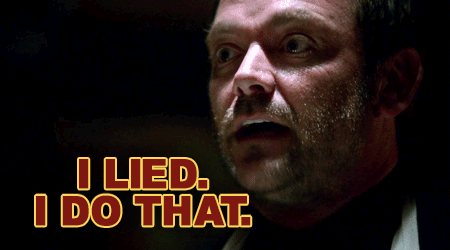
So, moment of disclosure here, my dad was a pathological liar. He lied about stuff but mostly it was weird stuff. He told a roomful of friends that he had terminal cancer. (Did he not realize they would notice when he didn’t get sick and, you know, die?)
Sam and Dean lie. They lie about being FBI, they use credit card scams to survive. They withhold information from each other (a form of lying). But they don’t lie pathologically. They don’t lie to Jody. They aren’t unscrupulous. Dean does periodically make fun of Sam’s scruples and Sam seems to have lost some of his, but Dean might act out of anger or fear but doesn’t lie or manipulate for personal gain.
Sam and Dean seem to scam enough money to eat, drink, keep the car running and periodically update the arsenal in the trunk. If they wanted to, they could probably stay in better hotels and live a little finer but as we saw when they were with Mick Davies, they rarely even stay in a 3 star hotel.
I will say that they are sometimes callous. Dean has difficulty with the distinction between what you are and what you do but has come, over the years, to have a vampire and an angel as friends. Their callousness is pretty much the callousness of first responders and people who have to face terrible things every day.
Interestingly enough, Dean is diagnosed as a narcissist by the psychiatrist he hallucinates in Sam, Interrupted. “And you're my...paranoid schizophrenic with narcissistic personality disorder and religious psychosis.”
Narcissistic personality disorder (NPD) involves a pattern of self-centered, arrogant thinking and behavior, a lack of empathy and consideration for other people, and an excessive need for admiration. Others often describe people with NPD as cocky, manipulative, selfish, patronizing, and demanding. (From the Mayo Clinic Website)
When people are talking about psychopaths, they are usually talking about people who exhibit The Dark Triad of traits; Psychopathy, Machiavellianism (a tendency to manipulate others for pleasure and gain) and narcissism. There are psychopaths who are not criminals, not serial killers, not…monster hunters. People like neuroscientist James Fallon. https://www.theatlantic.com/health/archive/2014/01/life-as-a-nonviolent-psychopath/282271/
So do Sam and Dean exhibit the Dark Triad of psychological traits?
Soulless!Sam lacks empathy.
Sam: Yeah, right. My brother was abducted so I’m pretty good on the whole proof part.
Sparrow: Your brother was abducted?
Sam: Yeah.
Sparrow: Oh my God.
Sam: It’s fine. I mean, I’ve had time to adjust.
Sparrow: Did it happen when you were kids?
Sam: No, like, half an hour ago.
He is more narcissistic than Sam with a soul; he knows he’s attractive and has a lot of sex. But weirdly enough, although he is easily bored and views other people as objects, he’s not particularly manipulative. He isn’t particularly manipulative in part because he is SO psychopathic he has trouble being charming. He doesn’t manipulate people very well because he is constantly saying insulting and awkward things.
When he has his soul, he can be arrogant pre-Lucifer rising. He thinks demon blood is a good idea. But, to be fair, he thinks demon blood is a good idea because he can exorcise the demon and save the vessel. His arrogance is the arrogance of ‘the ends justify the means because I know what I’m doing.’
Dean can also be arrogant. Dean is judgmental (telling Amy the kitsune that she would kill again because she was a monster and that’s what monsters do). Dean learned from John to commit and stick.
When Sam is about to do the third trial, Dean asks Sam if he knows what he’s going to confess.
DEAN: Your blood's supposed to be purified, isn't it? You ever, uh -- you ever done the "forgive me, father" before?
SAM: Well, once, when we were kids. Which is why I have no clue what to say now.
DEAN: Well, I mean, I could give you suggestions if you want.
SAM: O-okay. Yeah, sure.
DEAN: All right. Well, I'm just spit-balling here, but if I were you, uh... Ruby, killing Lilith, letting Lucifer out, losing your soul, not looking for me when I went to Purgatory,
Dean includes ‘losing your soul’ as a betrayal of Dean. It’s a little self-absorbed but it’s also a reveal of how betrayed Dean felt by getting back someone who was NOT Sam. It’s not manipulation, it’s not arrogance. It is profoundly lacking in empathy. And that will take us to the next characteristic.
Warning, you want nothing to do with this. I will not pretend I don’t have an agenda.
Part 1. Glib and Superficial Charm
Part 2. Goodlooking and Bored
4 notes
·
View notes
Text
Creativity is Intelligence and Having Fun
"Teaching student is an accomplishment, getting student excited about learning is an achievement" - Robert John Meehan
The last two (2) weeks of the discussion really made my week very happy and productive. The journey of learning this subject was very enjoyable from the beginning of the topic up until now. Firstly, we tackled the creative person, followed by the behavior patterns of entrepreneurs, the voice of the user, and lastly, market validation. I’ve also noticed to myself that I’ve figured out a lot of problems and issues nowadays that needed a solution by creating creative products or even services. The venture proposal really enlightened my mind to the things that really happen nowadays. Making the venture proposal is not that simple, but it’s also not stressful at all since it’s a group activity and a lot of minds are sharing their ideas and thoughts to make this thing easy.

Apart from making venture proposals, the discussion every week was very fun. I don’t know, but to be honest, I really love listening to and learning new things about this subject since the instructor was very kind and approachable all the time. I really do appreciate the effort exerted by our instructor during the discussion because, even though it’s a pandemic and it’s known that online classes are boring since some of the teachers are just reading the PowerPoint presentation, although I am not pointing out that we cannot learn, it really had an impact on the students to have an online class with fun and I could see it for this subject.

My most awaited part of the discussion was the activity. It is more like creating a creative mindset and just being happy and enjoying the topic and learning from what I’ve been doing. This subject had a significant impact on my future life because it enhanced my creativity as a person. Thinking skills should be inherited for this subject, as well as logical thinking. I was also able to determine who I was with my group. Am I the one who contributes knowledge or just contributes confidence to them? This lesson makes me think what a creative person I am now for my group and the people.
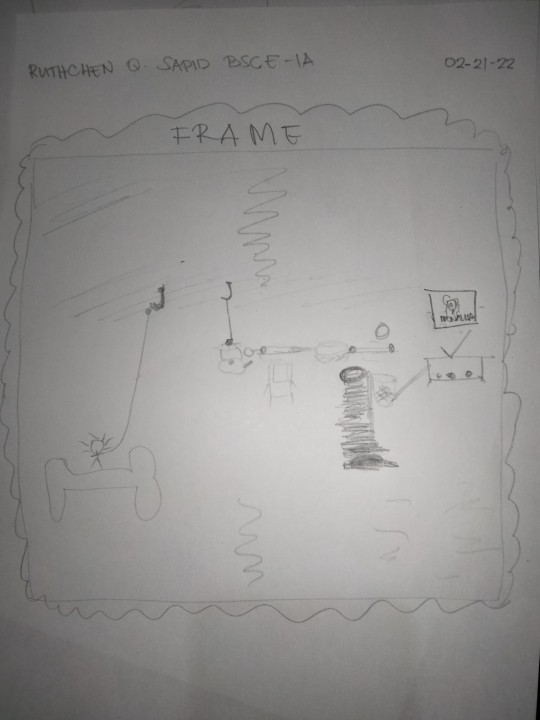
The Golden Rule that people knew was to “Treat others as you would like to be treated,” but in entrepreneurship, the golden rule was to “Treat others as they WANT to be treated.” It is critical in entrepreneurial behavior patterns to treat customers with respect, even if their attitude is negative. It is really good to accept hurtful words from your customers and learn from those mistakes. Success cannot be committed to if a person hasn’t experienced failure. It’s okay to fail occasionally; at the very least, you’ve learned from your mistakes and begun a new one. Entrepreneurs really have an impact on all of their behavioral patterns. These could be the things that they would remember in dealing with businesses. The pride must be set aside, and even if it’s your enemy, but it would be your customer then, you must set aside the anger and be a friendly entrepreneur. In this case, patience really is a virtue for success. Also, it is really good to think wisely about what may happen in reality and in the future. Your plans are really good, but we must adjust to the reality and be open to a failed outcome.
Additionally, through observations, we can understand people’s needs and problems. That is why interviewing people who don’t know you will eventually help you think critically and accept the fact of what people will tell you about your product. This could be the basis for a good product and could be something that a lot of people could benefit from. I am really excited about interviewing people who are new to me and finding out their needs. I also don’t just communicate with them, but learn from them.

0 notes
Text
Things to Consider When Choosing a Marriage Counseling Retreat

Whether you’re experiencing marital distress or just temporary gridlock, it can be difficult to know where to turn for help. With online therapy and a wealth of marriage retreat options available across the nation, separating the wheat from the chaff can feel like an overwhelming task. Moreover, New York Times articles like “Does Couples Therapy Work?” highlight the importance of choosing your couples therapist wisely.
As Weil points out in the article above, being an effective marriage or couples therapist is a lot different from being an effective individual therapist. Also, most couples and spouses reach a point of crisis before they turn to a third party for help.
However, study after study indicates that evidence-based marriage and couples therapy provide immense benefits for both parties involved. In fact, Psychology Today outlined five basic principles that effective marriage and couples therapists use to bring about change.
We thought we would go one step further to identify the seven key elements that will help you find the most effective marriage counseling retreat for you and your spouse.
With a properly trained and focused staff, a private marriage counseling retreat will provide you with the equivalent of 12 weeks of marriage therapy in 2-3 days. The intensive format is also proven to be more neurologically effective than weekly therapy sessions alone.
Just be sure to consider the following points before signing the dotted line.
1. Look for Marriage Retreats with Therapists who Avoid a “Neutral” Stance
The most effective marriage therapist is not a “neutral” party. Instead, they avoid taking sides altogether and align themselves with a third party called the “We.” A trained clinician will always seek out the good of your marriage over the perceived good of you or your spouse. They will view every interaction through the lens of what is best for your relationship and the strength of your bond.
While a “neutral” therapist might think to themselves, “What about this person’s side?” or “What about that person’s point of view?” the effective marriage therapist would ask themselves, “How good is this particular line of dialogue for the relationship on the whole?”
Taking a relationship-focused stance could mean the therapist challenges you or your spouse more than another at any given time. However, it does not mean the therapist is aligning themselves with the other person. Instead, they are choosing to intervene and communicate things they believe will serve you best as a couple — both now and in the future.
It is a perspective adopted by the most seasoned clinicians who understand that aligning with “We” is necessary to change the larger dynamic between both individuals. The end goal is to benefit the couple, the partnership.
2. Seek Out a Practice that Avoids Glamorizing “Hot-Button” Issues
There is a tendency in our culture to label certain relationship behaviors as “bad” or “worse” than others; this is especially true when it comes to affairs or issues related to money or finance.
While a shocking number of spouses have affairs, with emotional affairs occurring at even higher rates, there are countless ways spouses betray one another on a daily basis — some of which can be as or more harmful than a physical affair or even financial secrets. For example, failing to be physically or emotionally responsive to your partner in their time of need can be just as detrimental to your bond.
The concept of betrayal extends far beyond the zone of extramarital connection.
Sure, daily betrayals and emotional dismissals might not attract the same notice as something like infidelity. But through the lens of a trained clinician, they are just as damaging. It’s death by a thousand cuts versus a big blow to the head.
Seek out a marriage retreat or marriage therapists who understand the intricacies of daily betrayals and who treat these roadblocks with the same amount of care and concern.
3. Find a Practice that Understands the Power of Time Intensity
Originally started by John Gottman, the first private marriage or couples retreat intensives were called “Marathon Couples Therapy.” They were developed based on research that shows that couples therapy is more effective when it’s done in intensive doses. Sessions that are conducted in close time proximity to one another, then faded out over time, will net much better and longer-lasting results for your marriage.
This concept applies whether you are in crisis or are experiencing temporary gridlock with a singular issue, such as “Do we relocate for a job promotion?” or “Do we want to have a third child?” No matter what issues you and your spouse are facing, the intensive format will help you reach a resolution more rapidly and will help you sustain your connection for a longer period of time.
Neuroscience shows people are more likely to absorb new behaviors and translate them into change if they learn those behaviors in the context of an immersive experience. It’s a concept called rapid succession learning, in which a person is exposed to something repeatedly over a short window of time. Research demonstrates this is how human beings learn and change best.
Our marriage retreats are structured entirely around this principle. They are designed to provide you with numerous reparative, healing experiences that foster the acquisition of new skills in a condensed framework of 2-day or 3-day intensives. Therefore, whether you are navigating everyday issues, such as “Should we move my our mother-in-law into the guest suite?” or overcoming years of relationship tension, studies show the intensive format to be more effective.
Will you still get results from weekly therapy sessions? Absolutely. However, with the intensive format, you will get results much sooner, and they are likely to be longer-lasting.
4. Choose a Marriage Retreat that is Respectful of Personal Boundaries
An experienced clinician knows how to walk the fine line between vulnerability and personal comfort. Always seek out a therapist or marriage retreat that understands this delicate balance. The nature of the work we do is to stretch each partner outside of their comfort zone. We strive to help people act, behave and communicate in new ways that may make them feel more vulnerable.
However, we are always careful to do so in a way that still respects personal boundaries. It is a lot like going to the gym. On the one hand, you don’t want a workout that feels too easy. You want to know it’s having an impact. However, you don’t want to push yourselves to the point of injury.
We apply that same philosophy to our retreats. We are very respectful of each partner’s boundaries and continually check in with each person to make sure they are okay with the work we are doing. Our therapists also come from diverse backgrounds and bring a wealth of experience and training to the table. Using the most advanced modalities of couples therapy, we utilize nonverbal cues as well as physiological tools, such as heart rate monitors, to gauge exactly where you or your spouse’s stress level stands at any time.
There are also strategically scheduled breaks throughout the day, which will allow your mind and body to rest and digest the new information coming your way. Always seek out a marriage retreat or marriage intensive that respects your comfort level and paces the progression of their retreats thoughtfully.
5. Find a Marriage Retreat that Will Honor Your Goals for the Relationship

The vision of your relationship is a decision unique to you. If you want the most from your marriage retreat, look for therapists who will avoid imposing their values or opinions about how long you should continue to work on your relationship. Instead, find a practice that will encourage you to invest in the process and leave no stone unturned in your personal development.
One of the primary tenets we subscribe to is that any marital problems you are running into are problems you will face in any future relationship as well. So, we focus on creating change on an individual and relational level.
Our retreats include a very well thought-out protocol, which includes meeting with you and your spouse together to assess the history of your relationship and observing interactions, as well as working with each person individually. We find it equally important to understand you and your spouse’s personal histories, childhoods, and prior relationships. That way, we can discern what individual changes you need to make for personal growth.
This is revolutionary for most couples.
Suddenly, it becomes less about changing your partner and more about changing yourself and setting yourself up for future success — no matter which relationship you are in. Once you subscribe to this perspective, there is the potential for healing more deeply. The question becomes, “What is my responsibility in this relationship? What is my 100% to own? And how do I change those patterns so that I can thrive in the future?”
Once you look at your romantic life in this way, it becomes a win-win, with the focus being placed squarely on cultivating health, skill building, and healing. Anything that is a byproduct of your work at your retreat will benefit you and those you love for years to come.
6. Look for a Practice that Utilizes Research-Based Methods for Change
Most likely, by the time you decide to invest in a marriage retreat or marriage intensive, you are in need of real, expert intervention. Instead of a band-aid, you might even need a relationship emergency room. This is where research-based methodologies, such as the Gottman Method and Emotionally-Focused Therapy shine.
Look for a couples therapy practice or retreat center that utilizes leading research-based methodologies for couples therapy. Also, seek out a team of therapists who are focused solely on couples and who have the years of experience to prove it.
At NCCT, our therapists have over 150 years of combined experience in couples therapy. We are also the only center in the Northeast — and most likely the country — that is entirely dedicated to serving couples and expanding our knowledge and expertise of couples therapy on a daily basis.
Our therapists all engage in weekly “think tank” sessions to understand and apply new advances in couples therapy research. Moreover, every week, each therapist meets with couples between 15-40 hours a week.
Nowhere else will you find a team of therapists collectively working under the same roof supporting couples and families to this degree. NCCT is truly a one-of-a-kind center and has earned its reputation as the go-to place for couples in crisis.
7. Choose a Practice That Provides Real Follow-Up Care
True success from a couples therapy intensive is just as much about what you do after the retreat as it is about what you do during. Look for a practice that has a real plan for follow-up care, whether in the form of online sessions, mini-intensives, homework or weekly couples therapy.
At NCCT, we treat couples from all over the United States, so our follow-up plans are just as varied as the clients we serve. Nothing ever ends with the retreat. You will go home with books to read, worksheets, concrete tools and skills and the option of continuing with your licensed therapist via phone calls, regular sessions or shorter versions of our intensive retreats. In fact, 80% of the couples who attend our retreats come back for mini-intensives.
No matter what you do, find a way to revisit the tools and strategies you learned on a regular basis, especially if you are in crisis. Marriage and couples retreats are effective, but they are not a magic bullet. If you want to retain the gains you’ve made, you must invest the time. Thankfully, our clients get the support they need to make that a reality.
Also, for our out-of-state clients, we go the extra mile to help them find qualified therapists in their community. However, most decide to come right back to us as needed.
At NCCT, our marriage and couples therapists are true experts in the field. They have been published and syndicated across the web, from the Huffington Post to the Good Men Project, and are among the leading experts in subspecialties like stepfamilies, domestic violence, and family therapy.
Want to learn more about how a 2-day or 3-day retreat can transform your marriage?
Contact us, and our Retreat Coordinator, Martha Reeves, will help you create a customized plan unique to your relationship needs. She’ll even give you tips on fantastic places to stay and great places to dine while in the Pioneer Valley.
Best of all, once booked we’ll give you access to The Gottman Institute’s online Gottman Relationship Checkup, so you can begin your journey towards healing before you arrive. If you are having trouble coping with marriage challenges, reaching out to a licensed couples therapist might be the way to go. We apply science-based methodologies to every couples retreat, relationship retreat and couples therapy weekend we offer. We also offer weekly sessions for those who can find time to break away during the week.
Take the first step towards saving your relationship and schedule your free initial phone consultation now. We promise to be in touch within one business day.
#couples therapist#relationship counseling#couples therapy#marriage counseling#Northampton Center for Couples Therapy#Emotionally Focused Therapy#gottman method
0 notes
Text
2017 in Review
By tradition, it’s time for my annual review!
1 - What did you do in 2017 that you’d never done before?
Interviewed and got into fellowship, finally became 100% happy with being single, wrote a research manuscript from start to finish, burned out, recovered from the burn out, went to a protest, called a senator, called a rep, did a moonlighting gig, yelled at a patient, attended the funeral of someone near my age, baked bread, played D&D
2 - Did you keep your new years’ resolutions, and will you make more for next year?
Last year’s resolutions were: Make my health a priority (ehhhh), get into the top ID fellowship of my choice (yes!), and increase my romantic confidence (yes!).
This coming year, I resolve to find an exercise or daily activity I like that I can commit to at least on a weekly basis!
3 - Did anyone close to you give birth?
Yeah!
4 - Did anyone close to you die?
Yeah, my cousin.
5 - What countries did you visit?
Went out of the country for my cousin’s funeral
6 - What would you like to have in 2018 that you lacked in 2017?
More “life skills” like doing my own taxes, hosting dinner parties, an exercise routine or just a way to move around and stay fit on a frequent basis, more art and reading for leisure
7 - What date from 2017 will remain etched upon your memory, and why?
6/12/17, the day my cousin passed away and 12/6/17, the day I matched into fellowship. I’m only realizing now as I type this the pattern in the numbers.
8 - What was your biggest achievement of the year?
Getting into the fellowship of my choice!!!
9 - What was your biggest failure?
Due to my laziness, several bouts of illness, family tragedy, and multiple call months, I haven’t been able to stick with dancing. I hope I can change that next year!
10 - Did you suffer illness or injury?
Little things, like the flu but otherwise I was okay!
11 - What was the best thing you bought?
Probably the iPhone charging cable that now lives in my car. The number of times that this has saved my dying phone and my resident career is already too many.
12 - Whose behavior merited celebration?
Ladies of color. You are all the MVPs. Thank you to the black women who kept Roy Moore from winning the race in Alabama. Thank you for being the ones on social media and in real life teaching, educating, and supporting our communities through these fraught political times. Thank you for being the leaders when others remain silent.
13 - Whose behavior made you appalled or depressed?
*stares at the US Republicans who voted for the tax reform, Ajit Pai, those who agreed with the immigration ban, climate change deniers, anti-vaxxers*
Oh was that list too short?
14 - Where did most of your money go?
FELLOWSHIP STUFF. Application fees, airplane tickets, train tickets, dry cleaning for my suit. Then food. So much food.
15 - What did you get really, really, really excited about?
D&D (I know, how have I not played before?), Movies: Star Wars, Thor: Ragnarok, Wonder Woman, Dunkirk, GotG2, Logan, John Wick 2, TV shows: The Defenders, The Punisher, The Unit, GoT, American Gods, Insecure
16 - What song(s) will always remind you of 2017?
DNA-BTS
17 - Compared to this time last year, are you:
I. Happier or sadder?
I’m going to say the same as last year. Sadder. I’ve been really fortunate this year, but I think it’s been a tough year.
II. Thinner or fatter?
Same.
III. Richer or poorer?
Richer by a tiny bit.
18 - What do you wish you’d done more of?
More self care. It was hard to discern sometimes from self indulgence with family tragedy and work exhaustion
19 - What do you wish you’d done less of?
using food to cope with stress
20 - How will you be spending/spent christmas?
Star Wars with the family, and we hung out together <3
21 - Did you fall in love in 2017?
A bit more with myself, for the first time ever.
22 - How many one-night stands?
Zero.
23 - What was your favorite tv program?
GoT probably
24 - Do you hate anyone now that you didn’t hate this time last year?
But of course
25 - What was the best book you read?
The Grace of Kings by Ken Liu
26 - What was your greatest musical discovery?
BTS. I said KPop in 2015 but this year I actually listened through most of their music and I really enjoyed BTS in particular
27 - What did you want and get?
My fellowship pick, the opportunity to teach and demonstrate my sincerity to my profession
28 - What was your favorite film of this year?
Thor: Ragnarok
29 - What did you do on your birthday, and how old were you?
Turned 29, but I didn’t feel like celebrating and actually didn’t say anything. So two of my prior interns actually surprised me with a birthday party!! It was one of the sweetest things anyone has ever done for me.
30 - What one thing would have made your year immeasurably more satisfying?
If the tax reform had not been passed, I would be less fearful going into 2018.
31 - How would you describe your personal fashion concept in 2017?
Sports-wear type scrubs for work. Tailored black and navy pieces with a professional/sporty vibe.
32 - What kept you sane?
family, friends, medblrs. Podcasts like Sawbones and Friends at the Table. Grassroots political action. The Great British Bake Off.
33 - Which celebrity/public figure did you fancy the most?
Jason Momoa. I didn’t watch Justice League but he is a beautiful human being.
34 - What political/social issue stirred you the most?
Healthcare equality, DACA/immigration issues, net neutrality
35 - Who did you miss?
My maternal grandparents. My cousin who passed away. @descantforhope because she’s the best and I love her and her kids
36 - Who was the best new person you met?
My work bestie! We sit and commiserate about medical education, stationary, and sci fi.
37 - Tell us a valuable life lesson you learned in 2017:
We cannot silence ourselves when right and wrong are at stake.
58 notes
·
View notes
Text
Brand New! Cat Language Bible (tm) How To Finally Speak Cat!
New Post has been published on https://autotraffixpro.app/allenmendezsr/brand-new-cat-language-bible-tm-how-to-finally-speak-cat/
Brand New! Cat Language Bible (tm) How To Finally Speak Cat!

Buy Now




Breakthrough Japanese study shows that cats can understand
human emotions, even words




Today, I’d like to talk to you about something VERY special.
A new form of cat-to-human communication that
many cat owners have dreamed about…
but few have actually thought possible.
That is, until they learn about the latest science in animal communication,
shocking new information
which I will reveal to you in just a moment.
…on building a deeper, stronger bond with your loving feline friend.
And to be fair, one party already DOES understand the other quite well

Researchers in Tokyo, Japan found out this lesson through a careful scientific analysis.
“The Japanese researchers found that cats understand
humans, not just by voice tone but also by identifying
certain words including their names, the owner’s name,
various commands you’ve used, and many other
stunning eavesdropping techniques that you
had no idea about…”
They even understand our body language and vocal inflections.
As the parent, owner, whatever you wish to call yourself, your furry friend looks up to you, and has evolved to learn to communicate with those who stand above them and provide care.
Here’s the thing though… you probably have none of this skill. Not until you’ve finished this presentation, anyways.
But that’s okay.
Cats may have been domesticated to deal with us.
But we need to use our own brains to return
the communication back.
The Tokyo Research results on cat language understanding sent a shockwave across the animal communication field. As a fellow trainer in this area, I can tell you that this was basically our version of the 16th-century Renaissance, happening right before our eyes.

Incredibly, they showed it right back. They understood our love.
We continued this process for other emotions, both positive and negative. We were slowly but steadily building a mutual shared language between cat and human beings with every new discovery we made.
Now the process wasn’t perfect, as cats are indeed limited by various vocal and mental features that humans typically have a wider range in.
For example, cats use about 20 voice sounds to communicate to us humans. This is a fairly small number compared to the hundreds or even thousands of unique vocal sounds that humans can produce. This restrained us in some ways and forced us to use body movements to get the point across.
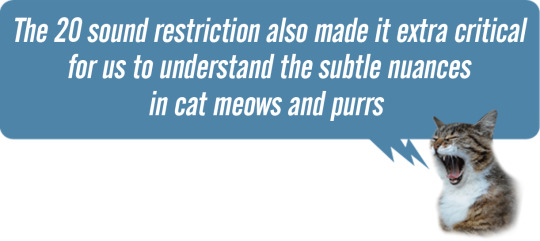
And boy are they subtle at times. If you shift an octave up or down, you may accidentally tell your feline friend you’re ready to do battle with her!
You can imagine how exhaustive the language deciphering process was. We are now 3 and a half years into this careful cat-to-human language process. Have we succeeded in building a mutual verbal understanding between parent and child, human and cat?
I’m happy to tell you today that the answer is YES.
I’ve titled our work as The Cat Language Bible™.
It truly is the go-to-guide for bonding with your cat
through language communication.

Just think about what this means for cat owners everywhere…
Have you ever sat on the sofa with your cat on your lap, just wishing you could actually tell her the level of affection you felt at that moment… using your own words?
Have you ever wished to have true, detailed conversations like a parent would have with his or her own child?
Have you ever desired to instruct or even discipline your cat without using a harsh voice, so that you could change behaviors without projecting negative emotions?

I’m very happy to say that you now have these powers. Because through our exhaustive cat language interpretation work, The Cat Language Bible™ can give you new, never before seen insights into your cat’s verbal communication abilities.
“Thanks to this book I now know when my cat wants to play and when she wants to be left alone (there are some huge surprises in cat language!), when she is feeling happy and when she is feeling down, when she is meowing for affection and when she is meowing cause she is in pain…not just that but now I know how I can effectively communicate with her. I feel much closer to her now and it takes your relationship to your cat to a whole new level!”
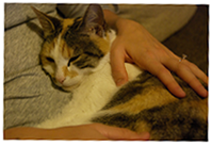
Mariah Walden & Minne, USA
“Before reading this book I had never realized how often my cat would gesture “I love you” at me! Now, not only do I understand when my cat is showing me affection, but I can also ‘say’ it back to him in a manner he understands. You can’t put a price to that!”
Deborah Smith, UK
I’m a middle aged guy who had gotten annoyed at trying to guess what my daughter’s cat was whining about, hence the reason I got this book. As strange as it sounds, we can now communicate and ever since tending to his communicated needs, he is no longer whining and we’ve become great buddies. I love the furry dude!”
John Higgins, UK
This is the guide that takes you from friendly
two word phrases that mean very little to your cat…
to actual conversations of the type you
would have with a small child.
Cats are amazingly intelligent creatures, in fact in some ways their brain even compares to a human adolescent.

You may have noticed how your cat even acts like a teenager sometimes! Other animals, like dogs, switch between simple feelings of joy and fear. But cats, having more developed brains can also feel lazy, remorseful, giddy, and a wide range of other emotions of significant complexity.
This is why it truly is my passion to help cat owners like yourself to take the next step and communicate with your animal at a higher level.
Because I’d hate for you to live another day being nothing but casual roommates, who give each other a wink and a nod… but don’t communicate any further.

Your cat’s meows and purrs are a sign of longing to say something more to you; as natural predators,
cats only make sounds like this when they REALLY want to get something across.
So every time you hear a sound like that, you can be sure he’s trying his best to send you a message.
Will you receive it though?
Does he desperately need kitty litter? Does he want to remind you of your favorite show that the 2 of you watch together?
Is there a rival cat or dog lurking nearby?
Are you forgetting to take him out for a walk?
Or even to go on an appointment that you usually go to at this time?
Yes, your cat knows these things.
We were quite surprised ourselves during the hundreds of experiments we ran with our volunteer parents and felines of just how detailed where the notes that cats took on our lives.
You wouldn’t believe some of the conversations
and even exchanges of humor between cat and owner
that we witnessed. Who knew cats
could make us laugh?
When you order The Cat Language Bible™ ebook, you’ll finally be able to directly translate various verbal and nonverbal cues as well. The guide goes over very specific thoughts, phrases, and feelings that your cat also communicates via body language.
We’re also going to show you how to respond back in a more effective way than the basic words or commands you may be accustomed to right now.
Vocal inflection, which is likely your main method of communication, is a great place to start getting the point across. But using specific word patterns further elevates the conversation. That’s why we use words, after all!
And since you are now finally in open communication with your feline friend, you’re going to learn some new things about your cat that you never knew about in the past.
A lot of this may actually test your current thoughts about what your cat likes and doesn’t like about her home, her hobbies, and perhaps even you, the master!
In our bonus guides, we also share some interesting, never before published information on specific nutritional secrets, care tips, and other items that we’ve personally found many cats greatly enjoy – that their human owners often neglect due to a lack of knowledge of their cat’s true desires.
Now you’ll not only be able to communicate with the little 4 legged one better, but also care for him even more.
I want to be clear that The Cat Language Bible™ is a cat language course that anyone can get to intuitively understand.
In fact, this isn’t something you have to study at all, because you’ll be able to look right at the guide and make interpretations on-the-fly.

Not everything they say is good, and in fact if you have multiple pets in the household, you may hear some interesting remarks about what your feline thinks about them!
But as I like to say, knowledge is power. I’d rather listen in on my cat’s personal thoughts so I can know him even better than I already do.
The Cat Language Bible™ comes with
three free bonus guides to help you maximize your
new cat language abilities.
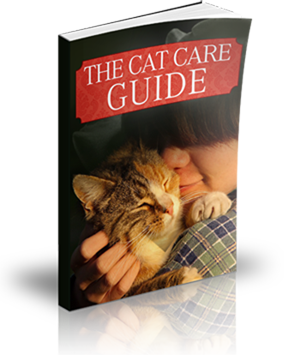
BONUS 1: THE CAT CARE GUIDE
The Cat Care Guide teaches you how to show love and compassion to your feline family member in a way that few others are able to match. You’ll learn how to accept your cat’s feedback and give him the proper attention, entertainment, support, feeding, and anything else based on what he is actually telling you.

BONUS 2: TRAINING YOUR CAT
Our second bonus guide, Training Your Cat, is all about raising a well disciplined and highly respective cat. It’s no secret that training cats can often be more difficult than training dogs. But again that’s because they have more evolved brains. And just like human beings will sometimes want to dictate their own paths at the wrong times, cats also need a little extra guidance in the form of strong training practices.
This is a guide to teach you how to build obedience the correct way, using love, instruction, and language feedback all together.

BONUS 3: A-TO-Z FELINE NUTRITION
Our final bonus guide is A-to-Z Feline Nutrition, and I’d like to think of this one as the fuel that powers our animal’s brains and bodies.
Follow this guide and you’ll literally allow your cat to live a life of strength, vitality, and creativity… or otherwise deal with chronic lethargy, fatigue, and an unfortunate untimely end.
Nutrition is absolutely critical for providing our animals their very best life, and that’s why this guide is so essential.

SUPERBONUS 4: FREE LIFETIME UPDATES!
The Cat Language Bible™ is the culmination of all my research and everything that is currently known about cat behavior and feline-to-human communication. It will show you everything you need to know to be able to communicate with your feline friend and be the best care-giver possible. However, I am still actively involved in the research and therefore I am promising you that if in the future (following new discoveries), I release a new version of The Cat Language Bible™, you get it for FREE! And you don’t have to do anything from your part – I will simply email you that latest version, so you can keep at the forefront of feline-to-human communication research.
What’ll I need to invest for the gift of cat language, Jonas?
Altogether this package would normally run you $199, and it would be well worth it at that price. You’re not only learning to speak to your animal and develop a bond and connection very few cat owners ever get to experience firsthand…
..you’ll also learn how to turn this knowledge into the best care, training, and even nutrition for your cat that even your Vet doesn’t know about!
Speaking of which, you’ve probably spent thousands of dollars at the Vet for basic health checkups so $199 for elite level understanding of cat language and care is like a dream package, even at our retail price.
But because I want you to experience the joy of communicating with your cat without thinking about the financials one second longer, I’m giving you an incredible offer today.
Order on this page, and you’ll get our entire system for not $199 – or even $99. You’ll get the whole system for one low payment of $27.
That’s right, just $27. Click the Add to Cart button below to order your copy of The Cat Language Bible™, along with your free bonus guides included in our package, right now!

CLICK HERE TO ORDER
ONLY $69.99 (Limited Time Offer — Now Only $27!)

Cat lovers all across the country have ordered
The Cat Language Bible™.
Here’s what they’ve had to say about it:
“I found the information in this book absolutely fascinating! It gives a thorough explanation with pictures on how cats use their eyes, ears, whiskers, mouths, meows and tails to talk to us and communicate to us not just their needs but also their emotions. It also gives very good information on proper cat care and invaluable tips on dealing with issues such as spraying and excessive night meowing. I love that I can now finally express to Jinny how much I love her!”
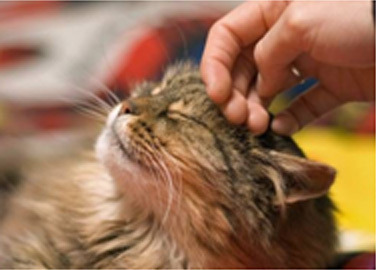
Henriette Marandi, France
“How would you like to have a tool that could translate what your cat is communicating into plain English? This book is that tool that you were looking for – fully illustrated with cute cat pictures so you become an expert at cat speak!”
Jody Small, USA
“This manual is a must read for every cat lover. I’ve been through several cat behavior books but none come close to this one in breaking down cat language to a level that is so easily grasped. The pictures are extremely helpful in conveying the message across and after going through this manual I immediately understood my cat better and now I’m a much better care giver and I have since noticed that my cat is being even more affectionate towards me. A great gift to any cat owner!”
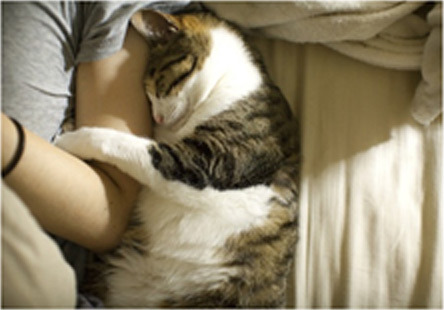
Duncan Brown, USA
“Warning: a lot of the things you think you know when it comes to cat behavior are WRONG and this book will shock you! I always thought that it was fairly evident when a cat is happy, angry, playful, loving etc…but this book showed me that I was hugely misunderstanding my cat. I now realize that I always mistook her apparent annoyance with actual affection, her apparent grumpiness with loneliness, and I could never tell when she wanted company and when she just wanted to be left alone. Now I do and I have noticed that she is much more receptive to me and actually for the first time ever she has started sleeping next to me rather than running around meowing. It is an incredible feeling to be able to communicate with her – we now ‘say’ I love you to each other every morning!”
Therese Linn (& furry Wendy), USA
There is no risk in this life-changing guide. If you don’t learn to
“speak cat,” you won’t pay anything.
If those stunning success stories weren’t enough, I wanted you to know that you’re completely protected by our ironclad, paypal-verified 100% money-back guarantee for a full 60 days after your purchase. That’s two whole months.
It works like this – if for any reason you weren’t able to communicate with your cat to the high level you expected, or maybe just didn’t have the time or motivation for it, feel free to send us an email to receive your money back in full. Without another word, we’ll promptly send the money straight back to your account.

Now’s the time to change your cat family’s life and open the door to truly understanding one another.
There’s so many more interesting conversations you can have with an animal that just aren’t available even with fellow human beings. I’ve seen it time after time, and the testimonials you’ve seen, as well as my own research, have made The Cat Language Bible™ the path to understanding your cat at a deep, personal level like never before.
It’s a bond forged from meow to hello, from cat eyes to your irises. The unmatched power of communication through speech.
This is Jonas Jurgella a.k.a. the CatMan, and I look forward to helping you discover the gift of cat language today.
“This is a huge eye opener for people who have cats and for all animal lovers in general. It is a very easy read supported with lots of photographs that clearly illustrated a cat’s language, whether it is communicated vocally or through its body language including eyes, ears positioning, whether the whiskers are forward, downwards, backwards, etc… It is an incredible wealth of knowledge on both understanding cats and communicating with them, so you can be a better cat giver and be able to adequately show your feline family member how much he/she actually means to you!”
Ute Fischer, Germany
“Being a ‘cat parent’ for most of my adult life, I was surprised at how much I actually did NOT understand when it comes to cat behavior and now after reading this guide, through understanding correctly my cats’ needs, they have practically stopped all ‘bad’ behavior and I have definitely noticed them being much more affectionate and loving towards me. It’s an incredible feeling being finally able to break down the language barrier between us and our most loved companions. This should be required reading for every cat parent out there!”
Anabel Daley, Australia
“I’ve got three cats – Bobby (in picture), Tiger and Max – and they have very different personalities. The Cat Language Bible has enabled me to see them in a totally different light – I now understand exactly how each one of them is feeling and what they’ve always been trying to tell me. I’ve found the part on feline-to-feline communication particularly fascinating as now I can finally understand their dynamic and I can adequately comfort Bobby when Max has been mean to him (Max never does this in front of me but now I know!). Great work Jonas, keep it up and keep us updated!”

Paul De Luca, USA
0 notes
Text
St. Vincent Is Telling You Everything
“I told you more than I would tell my own mother.”

September 10, 2017, 10:34 a.m.
By Laura Snapes | BuzzFeed Contributor
Reporting From New York, New York
Annie Clark was reconfiguring some older material for her upcoming tour when she realized how alien it felt to play it. She could adapt the arrangements to her harsher new sound — the sleazy, acid aesthetic of Masseduction, her upcoming fifth solo record as St. Vincent — but the writing’s proggy complexity was cockblocking the emotion. “In so many ways, I thought I was being completely transparent and brave in every record, only to realize that they are very oblique,” Clark told BuzzFeed News. She cackled and looked delighted. “Who knew! I had no idea.”
Clark is much too self-aware for this to be completely true. But the difference between her polite, guarded Texan past and confrontational present is colossal. When I first interviewed Clark in 2009, she nervously pressed her pendant against her lips and face, leaving a red lipstick pox on her insane cheekbones. By 2014’s St. Vincent, Clark’s public persona would be imperious.
But these days, she’s a playful freak who revels in showing the tightness of her grip, a disposition aided by long, straight eyebrows that dance like Memphis squiggles. In late July, she appeared in the lobby of New York City’s Marlton Hotel, her temporary home during the making of Masseduction. She had come from pilates — which she likes because it makes her sing better and “come a lot harder” — and disappeared to change out of her leopard-print gym shorts. When I mentioned a recent paparazzi photo of her looking like a sexy detective in another skintight leopard-patterned getup, she asked twice, with predatory delight, whether I’d looked at her camel toe. (No! Okay, maybe!) The only time her control slipped was when the hotel’s stereo started playing “Who,” a knotty song from the album she made with David Byrne, and she shriveled like a salted snail at hearing her own voice.
Self-possession like hers is often interpreted as pretentious, or pathological. But over time, the confidence that the younger, anxious Clark had to fake has become bracingly real. You can hear it in Masseduction, a record of pop fluidity and queer possibility. It’s the best thing she’s ever done, and there are no bad St. Vincent records. It’s partly harsh, heady, erotic synth-pop visions steered by her diamond-sharp guitar, and while Clark has written plenty of ballads, there have never been any as brutal and gorgeous as these. Its lurch between apocalypse and ecstasy mirrors how it felt to be kicked in the head by the past couple years.
In a way, Clark was right about the obscurity of her past work, filled with archetypes and distanced observations — emotions through a stained-glass window. If not a clear pane, then Masseduction is at least a peep show on heartache, fucking, addiction, destitution, and suicide. And her relatively new life as a very public figure, thanks to relationships with Cara Delevingne and Kristen Stewart, gives it an extra frisson. Tabloids will rush to find the former, the famed British supermodel, on an album littered with wasted bodies, especially on “Young Lover,” where Clark finds someone overdosed in the bathtub. She recounts the night with terror but also arrestingly ugly indignation. “Oh, so what / Your mother did a number / So I get gloves of rubber / To clean up the spill,” she sneers.
“Scenario has to rhyme, babe,” is all Clark said about its veracity. She was bemused at being asked to explain the lyrics. To her, this record is butt-naked. “I told you everything,” she stressed. “I told you more than I would tell my own mother. It’s right there.”

Annie Clark
Nedda Afsari
Masseduction started out with three tenets: It would feature programmed beats and pedal steel guitar, and examine power and seduction. “What does power look like, who wields it, how do they wield it — emotionally, sexually, financially?” Clark ticked off her fingers.
The album was properly born over a creative first-date dinner with Jack Antonoff, the Bleachers frontman who also recently produced and wrote with Lorde and Taylor Swift. Clark was looking for a teammate; they told each other everything that was going wrong in their lives and decided that total oblivion was the only way out of their heads. “It wasn’t, ‘Hey, let’s make a record together, that’ll be fun,’” Antonoff told me. “It was, ‘Let’s absolutely go all the way and find the absolute best thing that exists here,’ which is really the only way to work on things.”
That grit is Clark’s MO. Until recently, she claimed to have taken approximately 36 hours off in between returning from touring 2011’s Strange Mercy and starting work on 2014’s St. Vincent. The concerts for the latter were bonkers, starting the run as avant-garde, meticulously choreographed deconstructions of a traditional rock show, and ending it with exorcisms that entailed Clark crumpling down a 10-foot pink plywood pyramid like a drunken horse. She often stole objects from the crowd: a pair of crutches, someone’s dinner. The spectacle of her murdering the thing she’d trained for was addictive.

St. Vincent during the 2015 Coachella Valley Music & Arts Festival.
Frazer Harrison / Getty Images
“Touring became a blood sport for me. I mean, I was born with a whip anyway, and touring became this self-flagellating exercise,” she said, clenching her jaw and lashing each shoulder with an imaginary strap. “And I was seeking that kind of physical exhaustion; I was seeking the pain.”
She doesn’t know why, and she’s okay not knowing why, though eventually she did accept that her relationship to touring was a form of delirium. On the new album’s “Sugarboy,” a dystopian, post-Moroder disco banger, she describes herself as a “casualty hanging on from the balcony.” (She literally climbed rafters in some theaters, kicking away security guards.) This hysteria is one of the reasons she considers Masseduction her saddest record. “I lost my mind, I lost people, I gained people, I stopped touring,” Clark said of that period between 2014 and 2017. “It was just a lot of a lot, you know.”
After the St. Vincent tour dates ended, Clark had to learn to construct and value life away from the road — she had been on tour since age 16, when she worked as an assistant for her aunt and uncle’s jazz group. “And I still love that,” she said of touring, “but it’s more like a component of my life now rather than…my life.” Back home she indulged in a “period of bacchanalia,” and briefly got into self-medicating, an experience she turned into the lunatic track “Pills”: Imagine the Stepford Wives lost in Willy Wonka’s chocolate factory (Kamasi Washington guests on saxophone; Delevingne sings on the chorus).
She’s transfixed by the forces that can swallow us — “You know, drugs, sex, and rock ‘n’ roll,” she winked. “So corny. Kill me! Kill me dead!” Though sometimes she uses those themes to dress up more mundane relationship dynamics. “Savior” explores the unhealthiness of mutual projection through a funny S&M parable involving nurses and nuns and our tediously prosaic concepts of kink: “You put me in a teacher’s little denim skirt,” Clark moans on the song. “Ruler and desk so I can make it hurt / But I keep you on your best behavior / Honey, I can’t be your savior.” The album’s self-destructive dynamic comes out on the title track — “I can’t turn off what turns me on,” she wails over twisted guitar — and her protagonists never stop annihilating each other for their own benefit, whether for carnal kicks, or for the mothers who “milk their young” in the song “Los Ageless.”

The album cover for Masseduction.
Loma Vista Recordings
And then there’s the heartbreaking “Happy Birthday Johnny,” which sounds like a snowflake but crushes like an anvil. It calls back to the title track of her 2007 debut Marry Me, about “John” who’s “a rock with a heart like a socket I can plug into at will”; and to “Prince Johnny,” the decadent downtown royal from St. Vincent. She said she feels compassion and hopelessness for his self-destruction, but can’t judge because she’s just like him. Maybe he’s also a cipher for the way humans use each other — Clark flatly refused to talk about him. “One thing I have learned in six records and 10 years is that I’m not obliged to answer any questions — a lesson I more or less only recently learned.” She stared into the bar, fixing a grim expression through her orange aviators. “Next question.”
At any rate, the song is a whole story. Once conspirators, her and Johnny’s literal fire-starting days are behind them, and now he lives on the street, calling up Clark at New Year’s for “dough to get something to eat.” She demurs, and he calls her a queenly miser who’s sold out for fame. “But if they only knew the real version of me / Only you know the secrets, the swamp, and the fear,” she pleads. It is deeply tragic, being shamed — perhaps rightly — by the person who once understood your shame.
Antonoff theorized that she’s mourning a past on the record. On the forthcoming Fear the Future Tour (named after a new song, and to resemble a Jenny Holzer maxim), Clark said she probably won’t be flinging herself around stages as much because “I think I’m emotionally throwing myself around a lot more.”

A still from St. Vincent’s “New York” music video.
Alex Da Carte
In late July, Tiffany & Co. announced Clark as one of the faces of its fall advertising campaign. Diamonds and waspy Americana are a weirdly prim contrast to the freaky propaganda aesthetic that Clark is calling “manic panic” — the Masseduction album cover is a photo of a nice ass in a leopard-print thong bodysuit. But like any savvy propagandist, Clark’s image will be everywhere this year. Having directed a short film, The Birthday Party, as part of the horror anthology XX, she’s now due to direct a feature-length, female-led adaptation of The Picture of Dorian Gray. (“The most rich text I have ever read: transgression, modernity, society, repressed queerness.”) There’s also a multimedia performance as part of October’s Red Bull Music Academy in Los Angeles, and an upcoming art exhibition in New York. A coffee table book. Essays. (She calls art “a fountain of youth” that’s given her everything and everyone in her life, hence her urge to make everything.) And that’s just the exposure she has control over.
Celebrities like to pretend that their success is the result of some cosmic fluke, but Clark has said quite openly that the best part of becoming more famous thanks to her love life is “just getting the opportunity to do more work in different fields,” which nobody ever admits! (Though her 2015 Grammy for Best Alternative Album and overwhelming critical acclaim probably helped, too.)
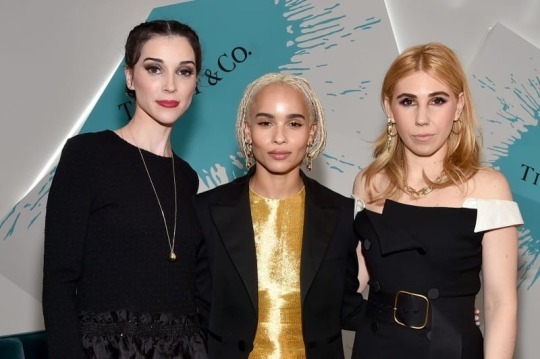
St. Vincent, Zoe Kravitz, and Zosia Mamet at the Tiffany & Co.-presented Whitney Biennial VIP Opening in March 2017 in New York.
Mike Coppola / Getty Images
One of Clark’s best-known songs, 2014’s “Digital Witness,” is about social media voyeurism. “I wonder if, in the future, privacy will be something that only the 1 percent can afford,” she told Rolling Stone that year, which now seems beautifully naive. From the second she and Delevingne were spotted together at the 2015 BRIT Awards, the UK’s pervy yet ever-scandalized tabloid media went nuts that their hottest young model was dating a woman, and pursued them so staunchly that the couple once took revenge by firing water pistols at the paparazzi.
“She really is so famous!” Clark said of Delevingne, feigning hammy disbelief at the attention they received. “That shouldn’t have been shocking to me, but it was shocking to me in the sense that she’s such a sweet, really, deeply kind, unspoiled person. She has more compassion in her little finger than—” She waved her hand around her torso with a grim laugh. (The pair reportedly split last fall, but Clark would only say they were “never not close.”)
Clark’s self-assurance helped her to perceive the tabloid aggression and celebrity weirdness as baffling rather than distorting. She was too classy to run with my suggestion that attending that Taylor Swift 4th of July party must’ve been an interesting anthropological study. “That was, I think, in the midst of a game of Celebrity,” she said of a photo of her wearing the same stars ’n’ stripes onesie as Gigi Hadid, Karlie Kloss, and Ruby Rose. She took a long pause. “I was very bad at it!”

From left: Cara Delevingne and Annie Clark
Schiller Graphics
But she was disturbed by dangerous high-speed car chases from paparazzi in pursuit of photos of the couple; she thinks the gossip industrial complex relates to a wider societal disparity. “The biggest problem was that the value system of it is all based on aspiration,” she said with genuine concern. “It’s wealth aspiration, fame aspiration. But if the government, if the world was just generally a more compassionate, empathetic place, people wouldn’t be aspiring to…that. They would be more fulfilled with their own lives if the wealth gap in general wasn’t so insane.” Admittedly, it was hard not to want to look at them, in matching sharp suits and laser-cut Burberry, queering the archetype of the male rock star dating the young supermodel, watching the context around an established artist mutate in front of you.
There is the kind of halfway-benign personal invasion where paparazzi follow you and your girlfriend around an airport. But then there is the kind where the never-not-creepy Daily Mail doorsteps your older sister at home in Texas and calls up your well-meaning uncle to sandbag him into revealing that your father went to prison in 2010 for participating in multimillion-dollar stock fraud. Although it is grotesque to treat the paper’s muckraking as a puzzle piece, it did illuminate part of the story behind Strange Mercy, which Clark had — understandably — only ever vaguely attributed to an overwhelming period of loss. “Suitcase of cash in the back of my stick shift,” she sang on “Year of the Tiger.” “I had to be the best of the bourgeoisie / Now my kingdom for a cup of coffee.” (She cowrote the song with her mother, Sharon, who split from Clark’s father when she was three.)
“Everybody has their personal tragedies and their crosses to bear,” Clark said in a clipped tone. She calls her father’s 12-year prison sentence “a horrible tragedy. On so many different levels. So absolutely heartbreaking.” She — an adult — could handle it. But her younger half- and stepsiblings on her father’s side are still teenagers. “And I specifically would never talk about that or have ever mentioned that in a myriad of questions about Strange Mercy because it seems like an incredible betrayal of my family. But most specifically, my youngest siblings who are innocent children. They were kiddos.”
She described the Daily Mail story as “faux concern,” and reiterated that the paper couldn’t find any dirt on her, no matter how outrageously they tried. “I’m not ashamed of my family,” she said. Then I asked her whether her father going to prison had spun her own moral compass, or made her reconsider any values of right and wrong that he may have instilled in her. She was momentarily confused, and then let rip a massive, absurd, demonstrative laugh. She kept going. “I love my father,” she said eventually, still tickled. “I love my father very much, as any child loves their parent. He’s very intelligent and erudite and a good writer and incredibly well read, and those are all things that I value and I’m glad that he instilled in me.” She paused, and kept on laughing.
In the run-up to announcing Masseduction, Clark was Instagramming absurdist junket-styled videos, in which she wears a hot pink skirt and a transparent rubber top the color of ash, and takes questions from an off-screen interviewer. Her answers were scripted by the musician and comedian Carrie Brownstein, who is also her ex-girlfriend. One video poses the question of whether Annie Clark and St. Vincent are the same person. She pauses to consider. “Honestly, you’d have to ask her.” What’s it like being a woman in music? “Good question,” she muses, as the camera zooms to her black and yellow fingernails, which spell out “FUCK OFFF.”
These films might factor into her upcoming tour, but the answers were also written for journalists. Earlier in July, in London, Clark found alternative ways to conduct interviews for hours at a time. She invited some female journalists to get massages with her (too weird with men, even though she was face-down on the table the whole time, avoiding eye contact). Other writers were invited into a 10-by-10-foot pink wooden box that was constructed in a North London studio especially for the occasion. Her interrogators had to duck through a low door to enter the blacklit space. “Not full-on crawl, because that’s a little heavy-handed,” she clarified. Inside, she looped a pedal steel recording and lit a Diptyque candle that struggled to mask the paint fumes.
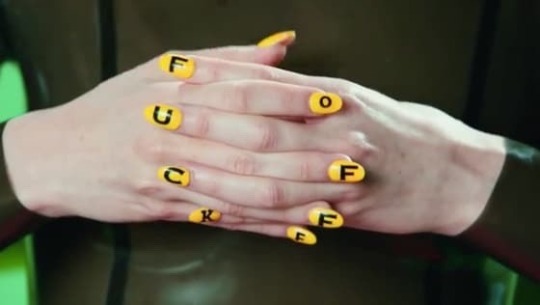
St. Vincent / Via Instagram
If anyone asked her an obvious question — like where the name St. Vincent came from — she planned to play prerecorded answers and “check my email, or stretch, or zone out for a second,” she said, sounding almost disappointed that she didn’t get a chance to enact her schemes. She insisted she wasn’t being antagonistic. But sitting opposite Annie Clark for two hours is often intimidating enough without the added fear that she’s about to make fun of you to your face: It is a gigantic power play! “Oh, deeply so,” she said, affecting a wryly elegant tone. “But then also not at all because I was the insane person stuck in a box for eight hours!”
If critics and fans are bored of this sort of thing — see Arcade Fire’s recent album campaign — they are clearly not as tired as the artists who have to smile politely at writers who don’t know how to use Google. Plus, Arcade Fire’s hijinks felt cynical; Clark’s feels like a rejection of the idea that women artists are meant to be relatable, having endured a career’s worth of inane juxtapositions between her pretty face and gnarly shredding like it means anything.
The point, she said, was that putting ourselves in a totally different, slightly strange context can produce interesting results. (She and I were meant to do Pilates together — before an oversold class spared me the indignity.) Why not make everything thoughtful and curated? If the stakes are already high, why not aim even higher and put yourself in extreme circumstances to see what happens? If Clark has done two things for the cerebral indie-rock world that she’s long outstripped, it’s teach about sex (thank god), and expose its low-risk complacency for a con.

Nedda Afsari
Of course, in some people’s eyes, this makes her a phony, a manipulator. Earlier this year, legendary cultural critic Greil Marcus wrote an admirably dim-witted column for Pitchfork where he compared Clark to the slippery Father John Misty, aka Josh Tillman, claiming that they “perform as artists of such pretentiousness you couldn’t possibly figure out how to talk to them. … There’s no way to address a saint: To be a saint you have to be dead … Such characters allow themselves to appear as if touched by God, which is what they’re selling, and laugh at you if you’re so square not to know who they really are: to join their club.”
If Marcus had read any of the million interviews that Clark is parodying in her high-concept clips, he would know the name is rooted in humiliation and squalor — the hospital where Dylan Thomas died — rather than divine aspiration. “And I have never, nor would I ever, put the kind of trapdoors and booby traps in my music to make the listener feel dumb,” Clark told me in response to Marcus’s theories. “I have enough hubris not to kill myself, but I actually have such a deep respect for the listener that I have never tried to pander. Songs and arrangements were complex and convoluted at times, but they were sincere attempts at connecting.”
She hoped there will be no mistaking her intent with her new record, which “is so first-person and sad.” But if anyone does, she knows it’s not her job to correct them.

A still from the “New York” music video.
Alex Da Carte
A still from the “New York” music video. If you want to use Masseduction as a treasure map, then this is what it tells us about Annie Clark’s personal life. She experienced a complicated kind of heartbreak. Sometimes that makes her crazy and neurotic: “I won’t cry wolf in the kitchen,” she swears on woozy opener “Hang on Me,” but threatens to jump off her roof “just to punish you” on the vengeful, cracked opera of “Smoking Section,” the last song. Sometimes a mental safety net stretches out when she might otherwise get hurt. “Slip my hand from your hand / Leave you dancing with a ghost,” she sings on “Slow Disco,” the most tender song she’s ever written. “Don’t it beat a slow dance to death?” a forlorn and disembodied voice repeats as it fades out.
Her world is changing, and that’s unsettling. “Too few of our old crew left on Astor,” she sings on “New York,” a song about lost heroes. On “Fear the Future,” she belts the title as the song reaches a pyrotechnic cataclysm that sounds like a truckload of fireworks being dumped inside a volcano.
But if you respond in kind to Clark’s vulnerability, then these are the more meaningful revelations that we can take from Masseduction into our lives: Relatability is a crock, and sincerity doesn’t take a single form. “I refuse to seem less threatening, if that’s how I’m perceived,” said Clark. “Ultimate freedom is not caring whether you are liked, because you are making something you really love and believe in.” On Masseduction Clark tells us that all the good forms of desire — love, sex, art — are self-destructive. But at their best, they create just that little bit more than they consume, and can eventually alchemize anxiety into total power.
130 notes
·
View notes